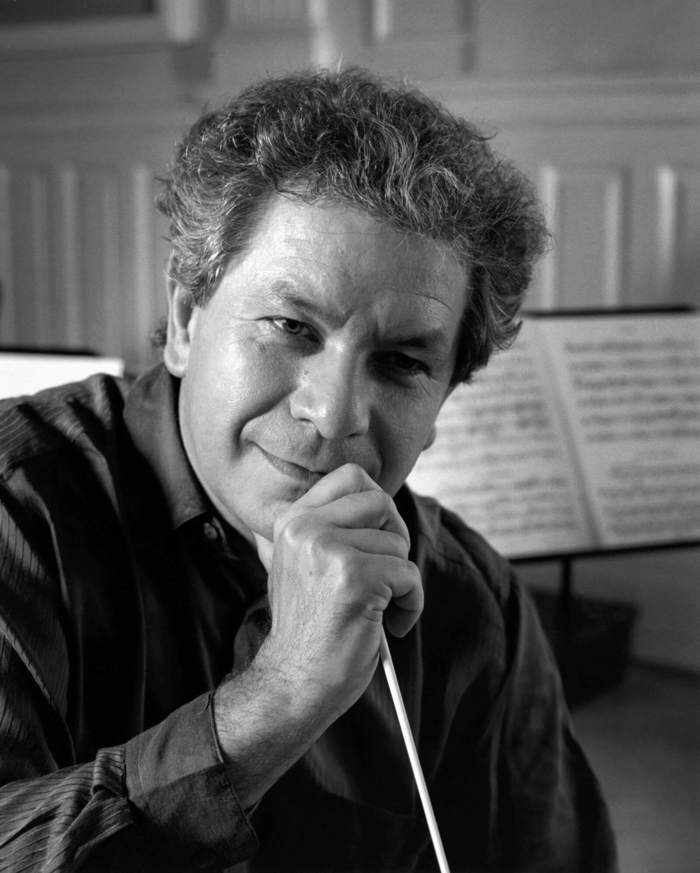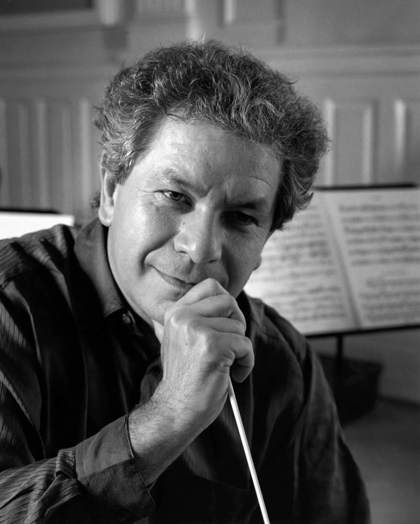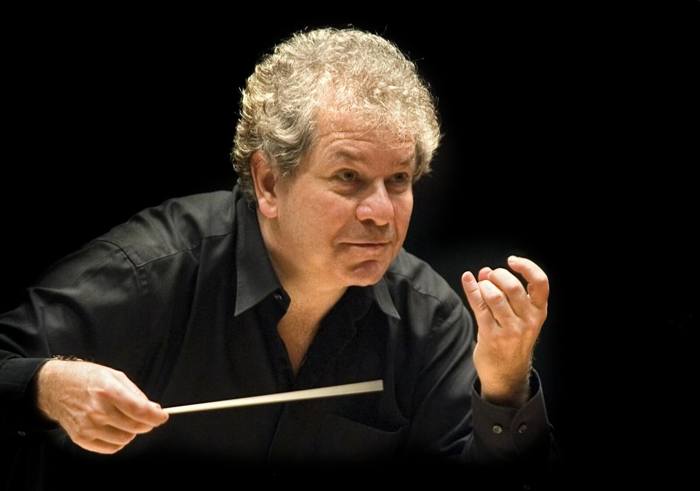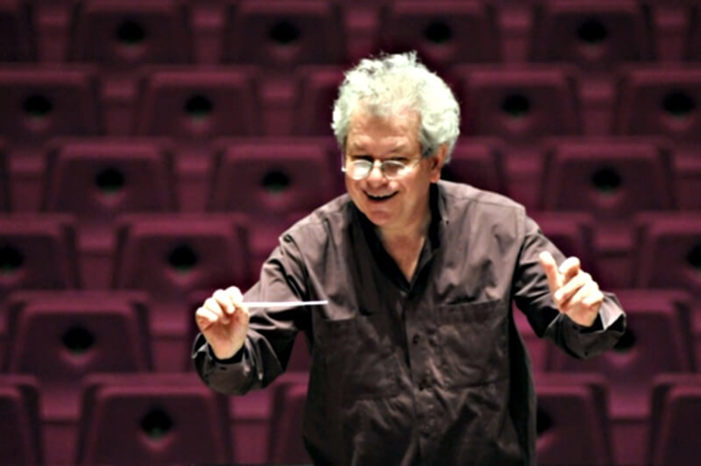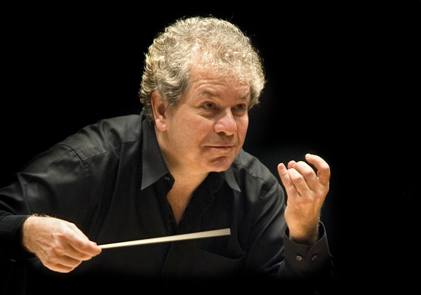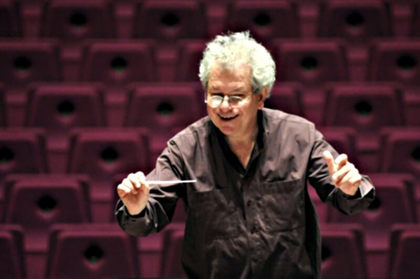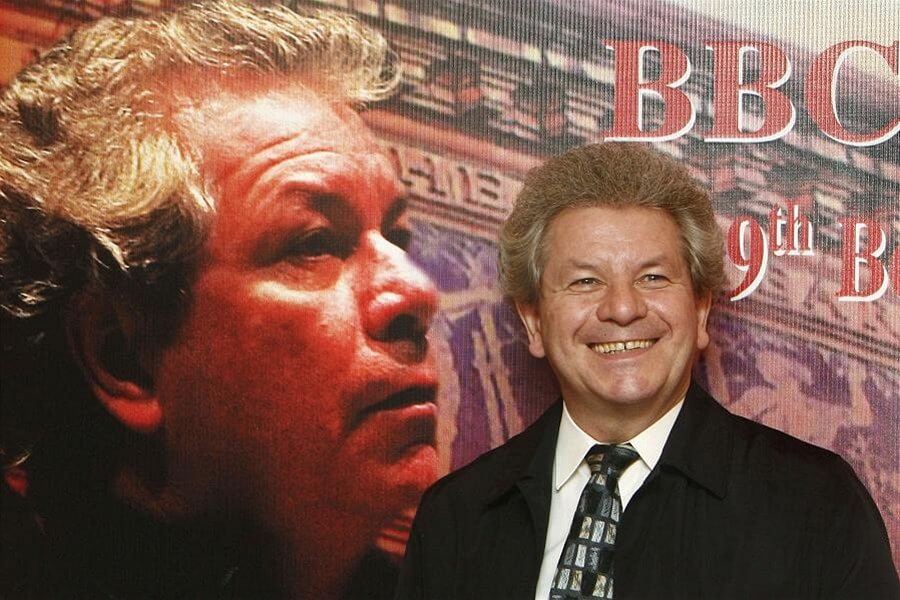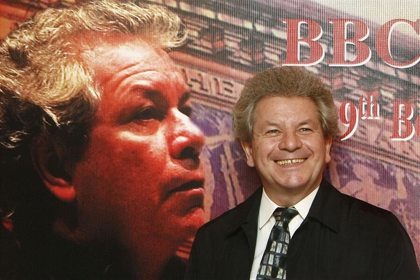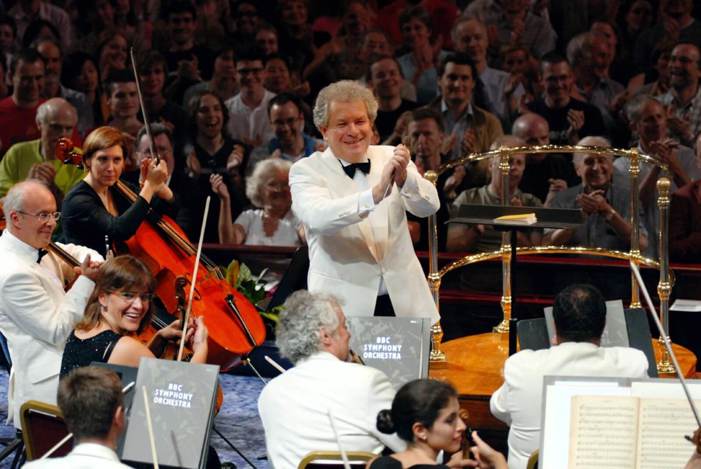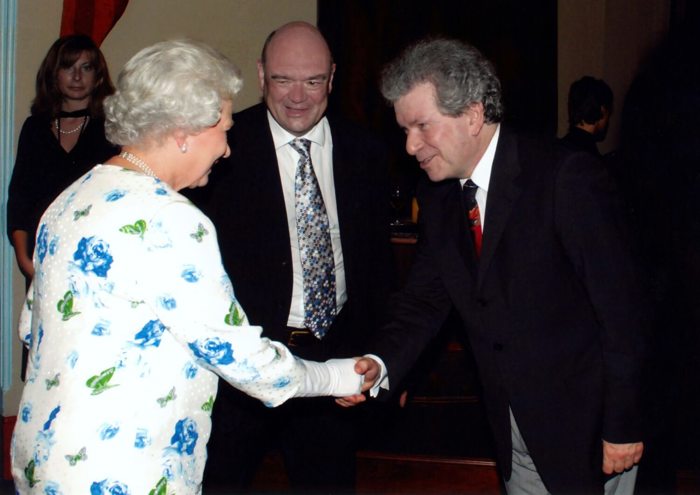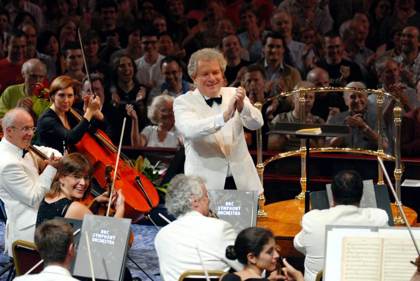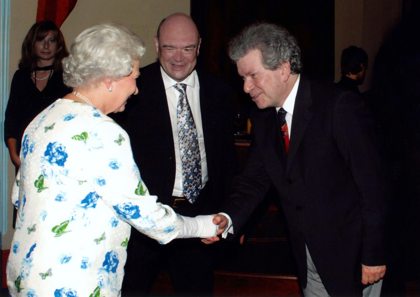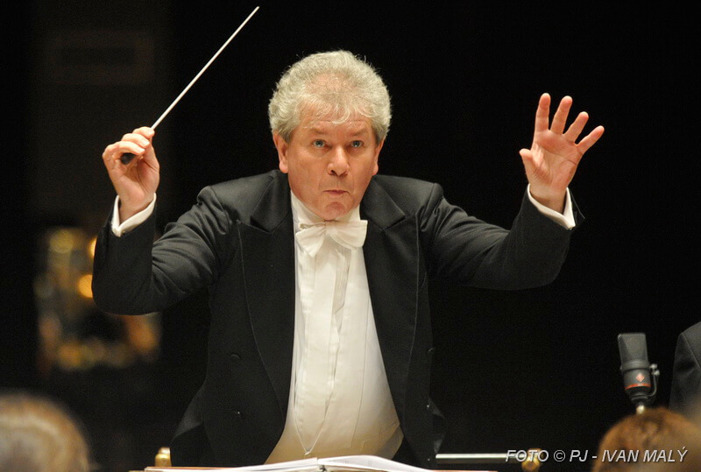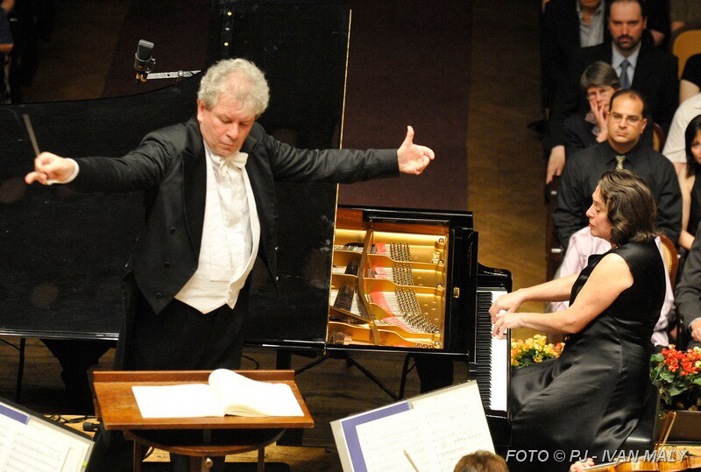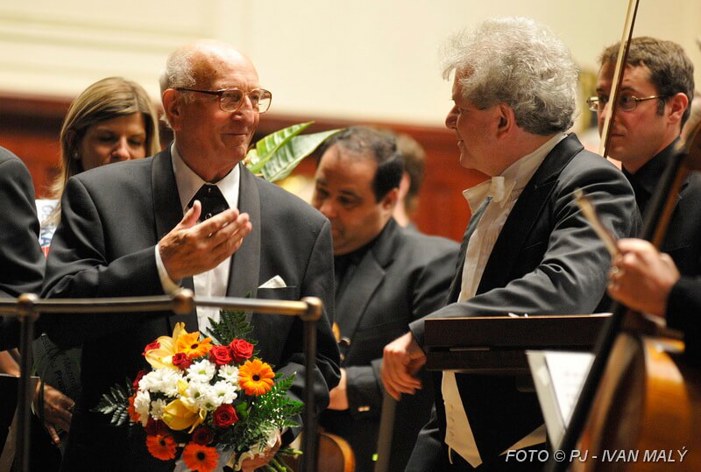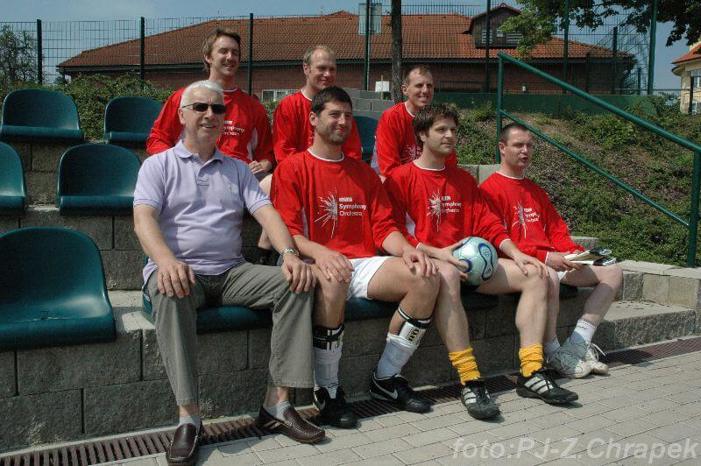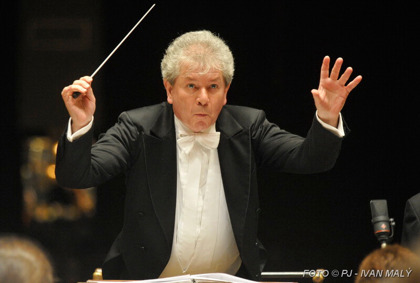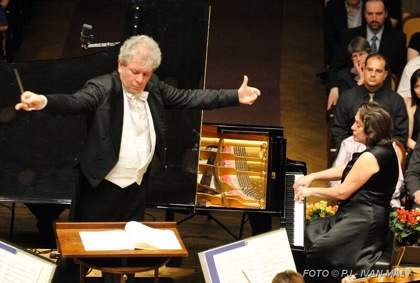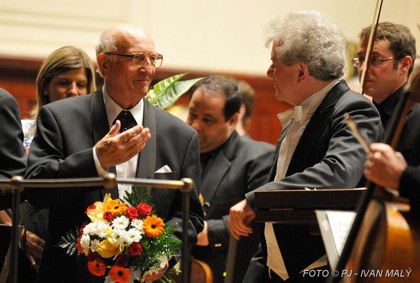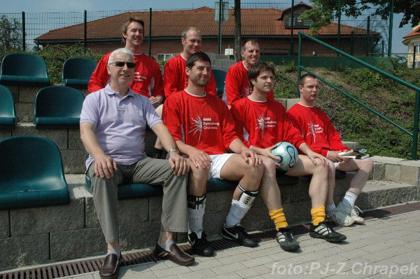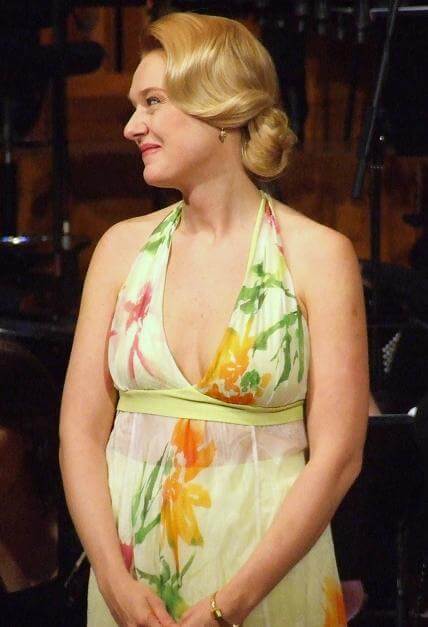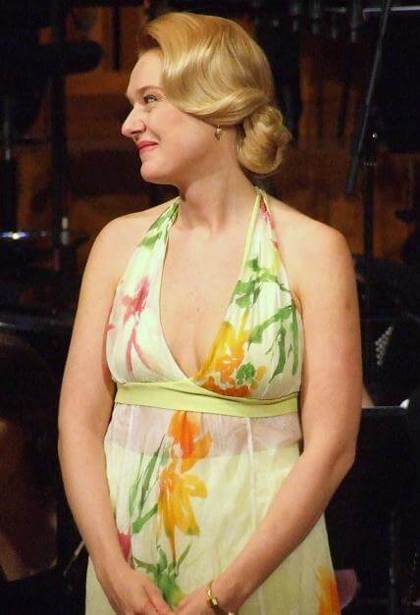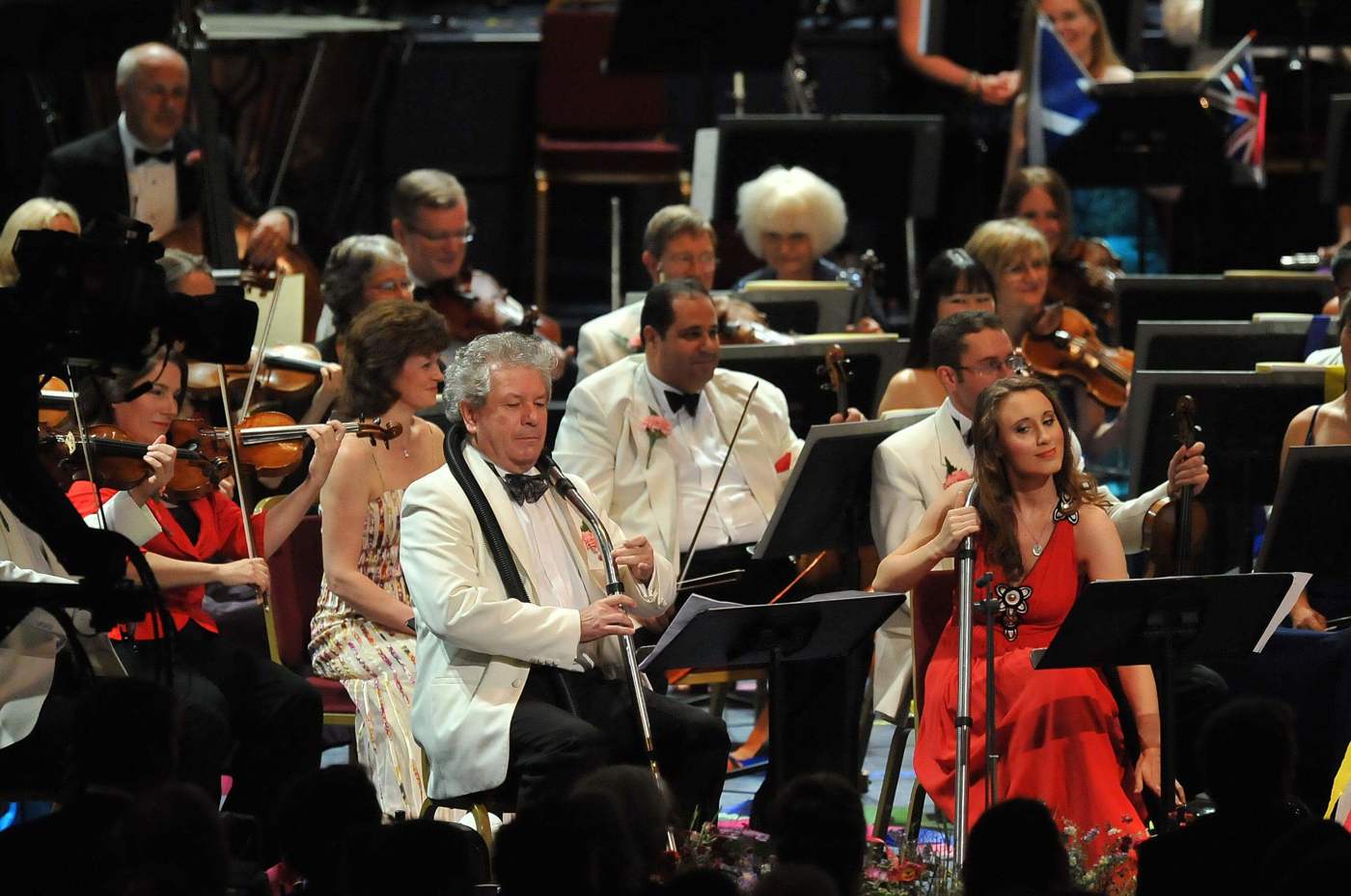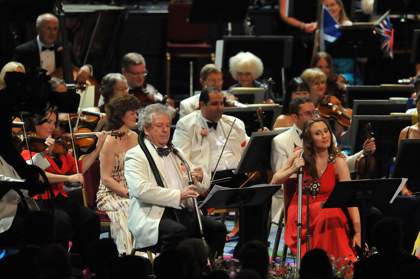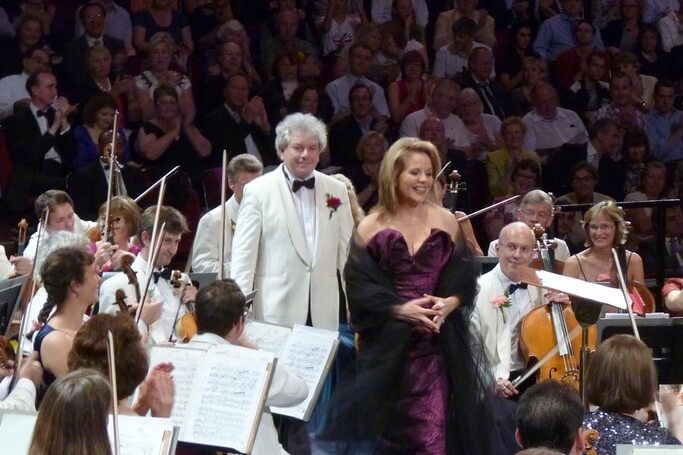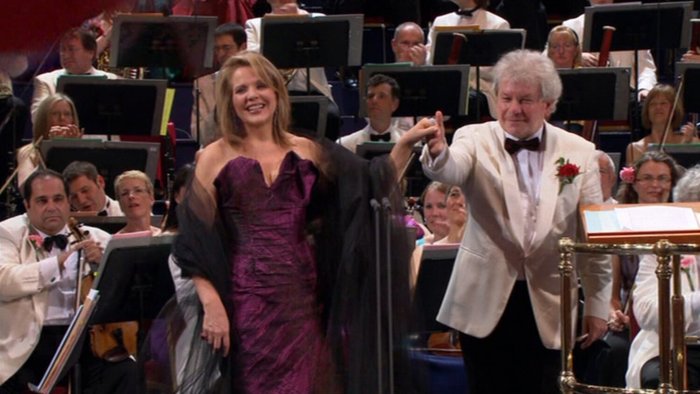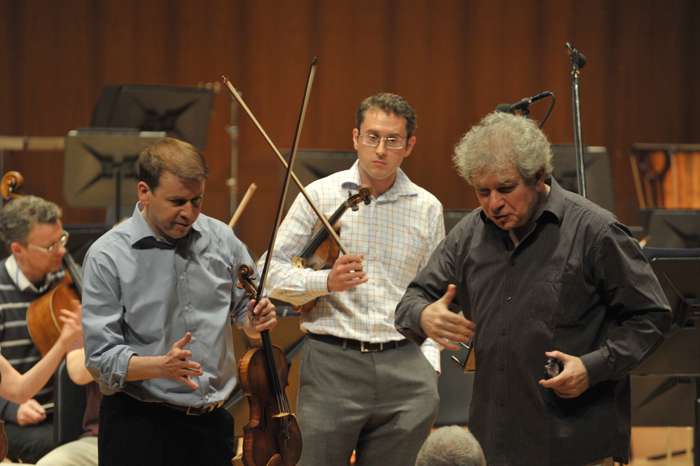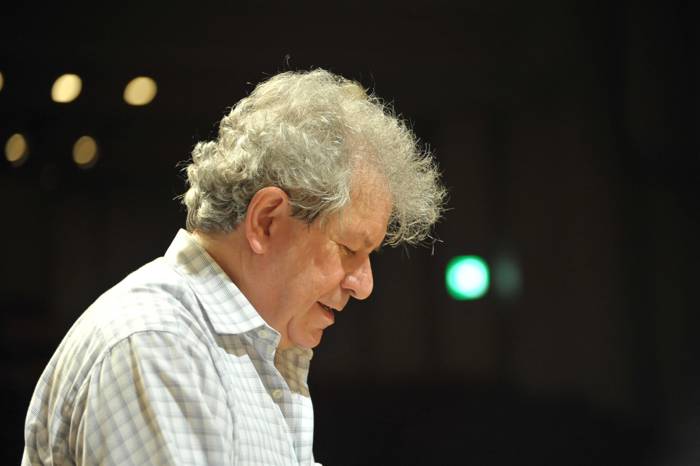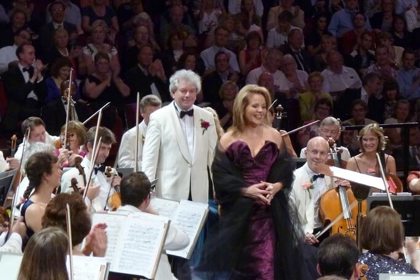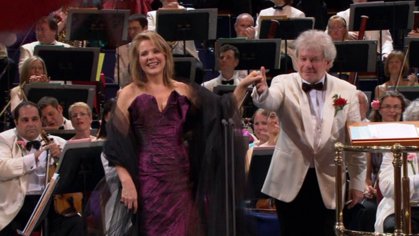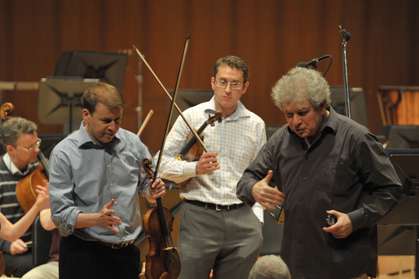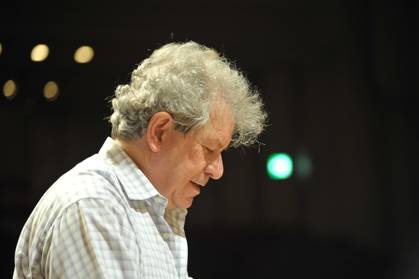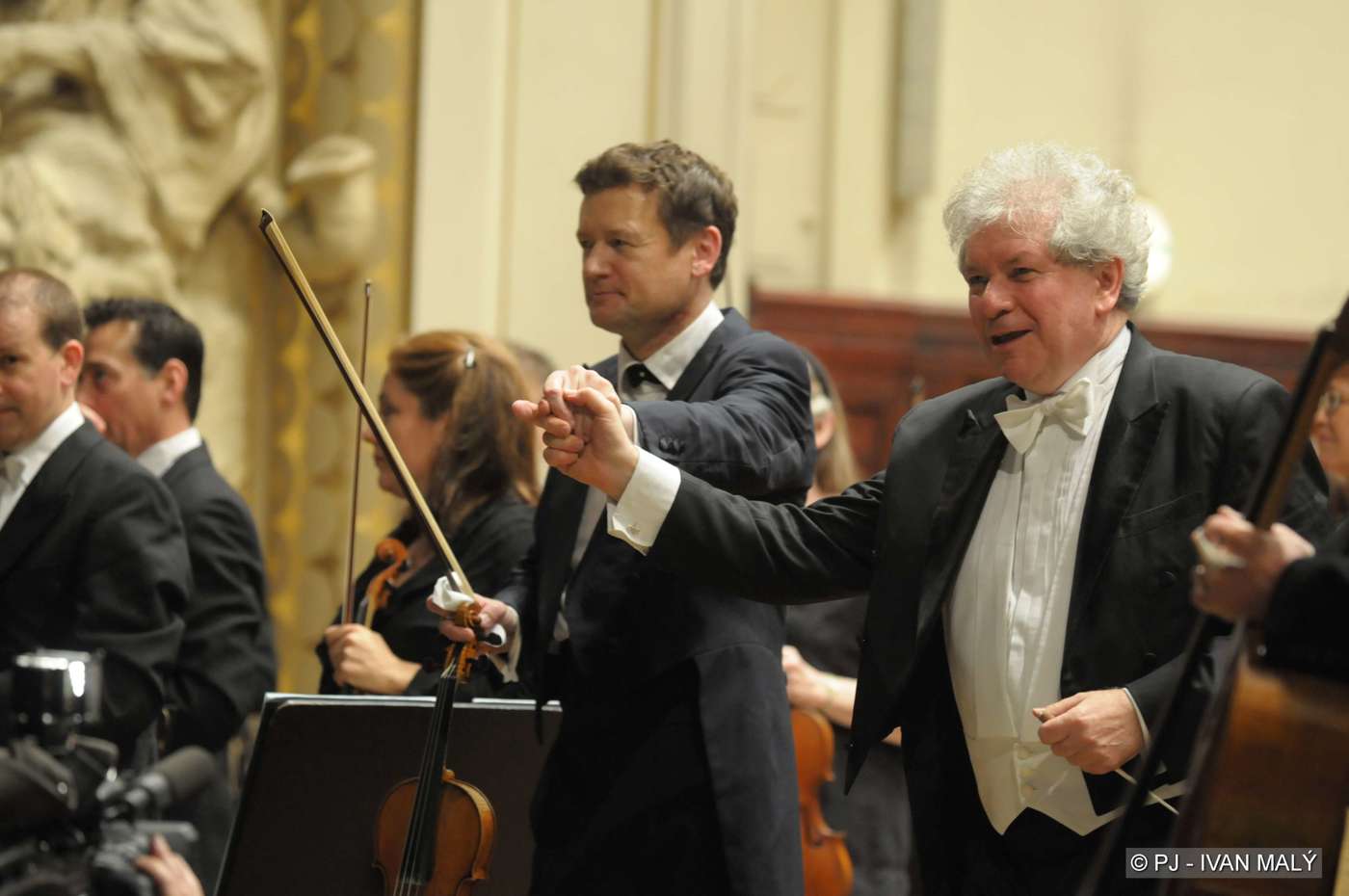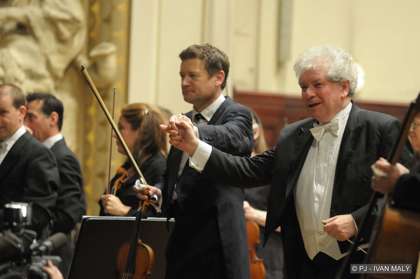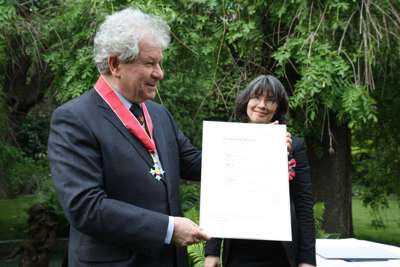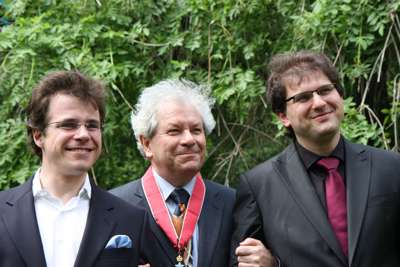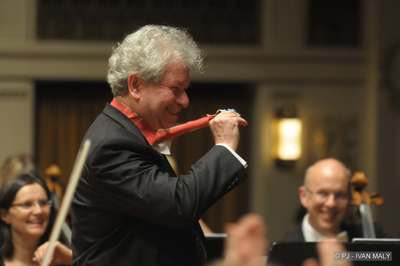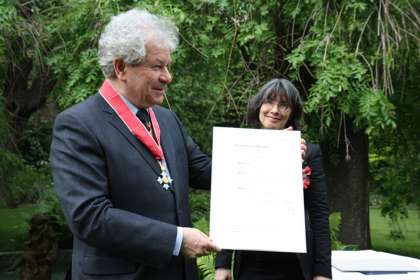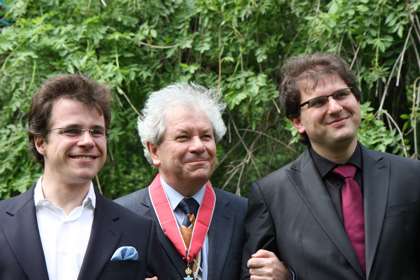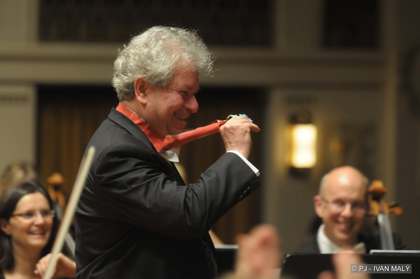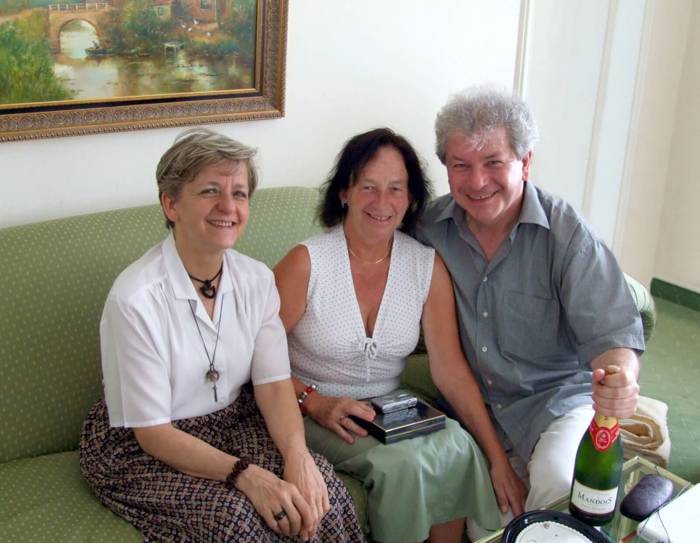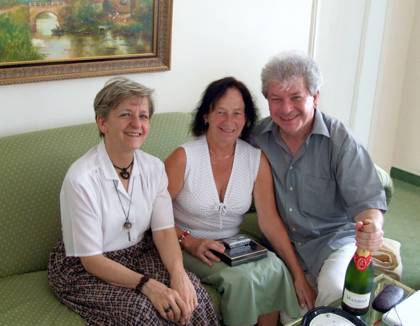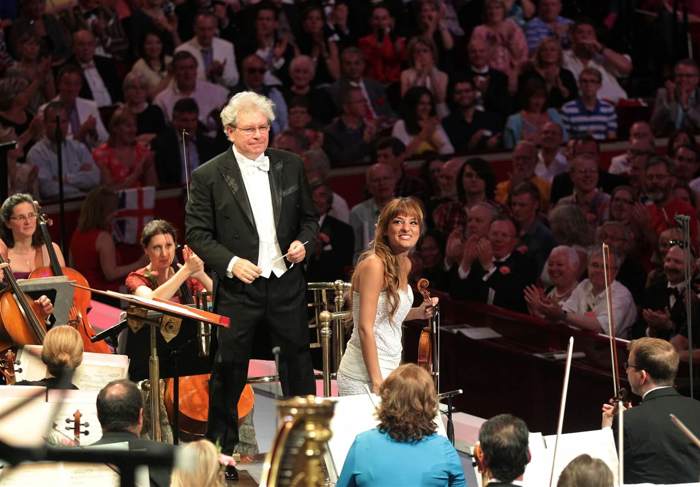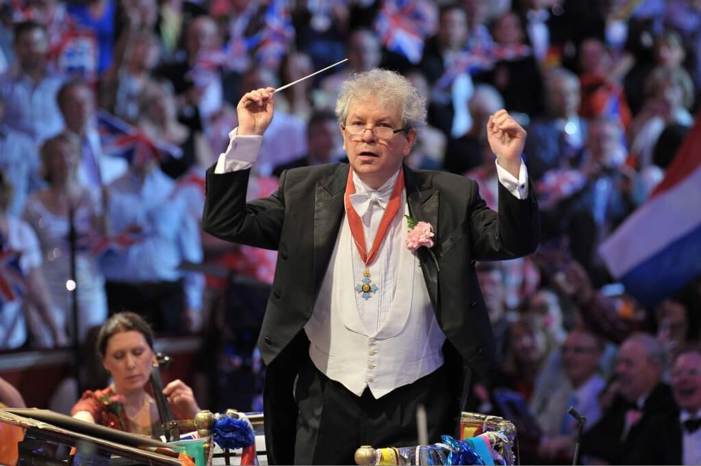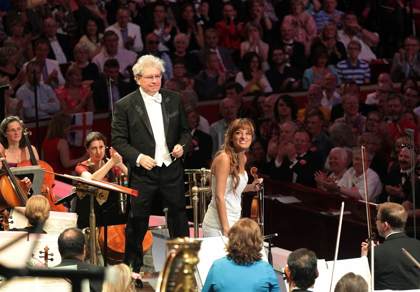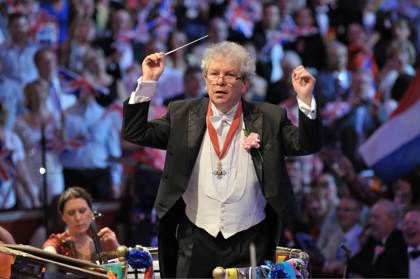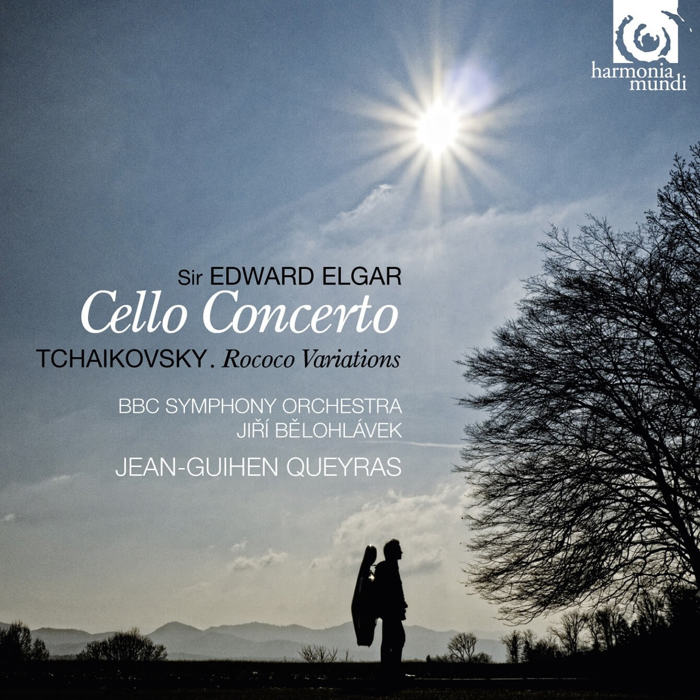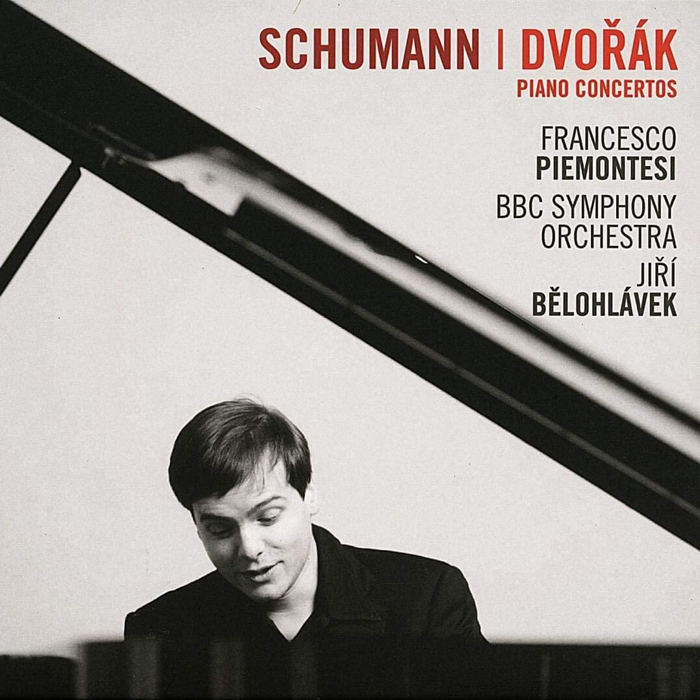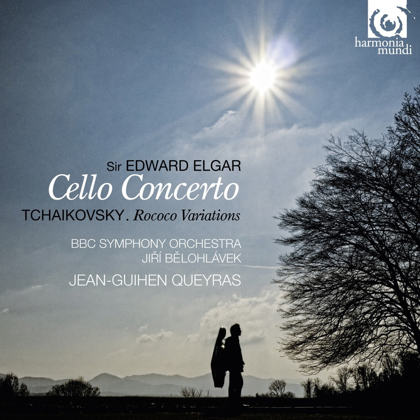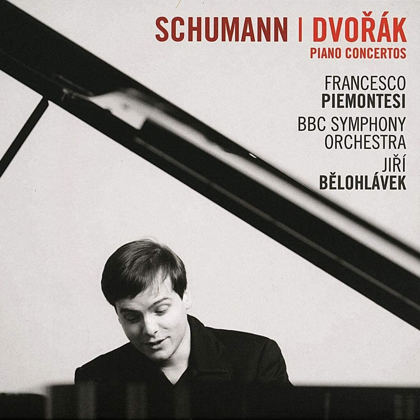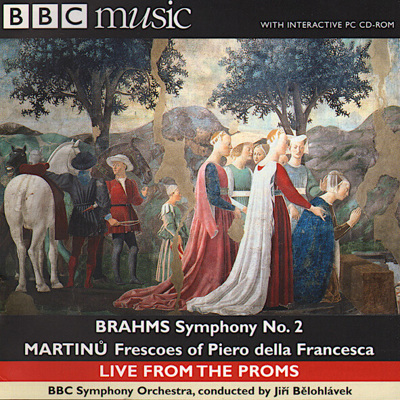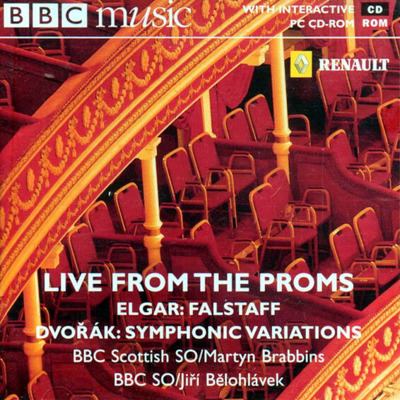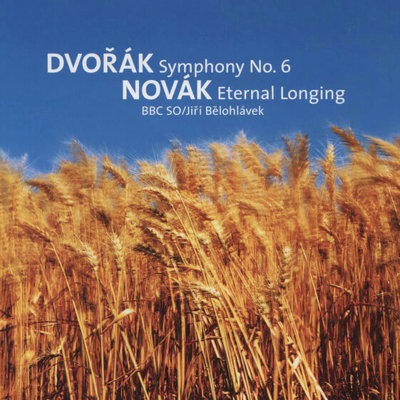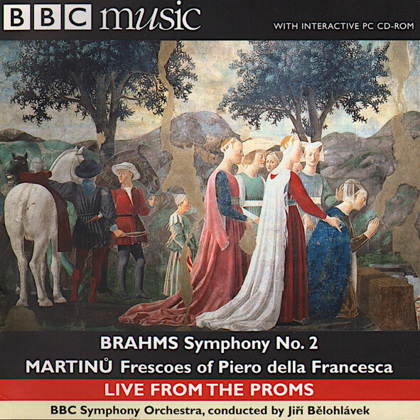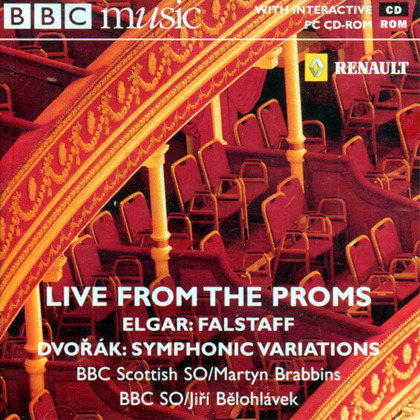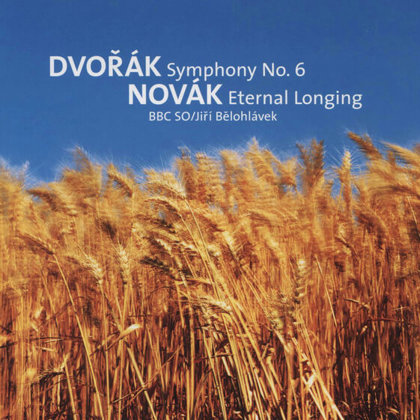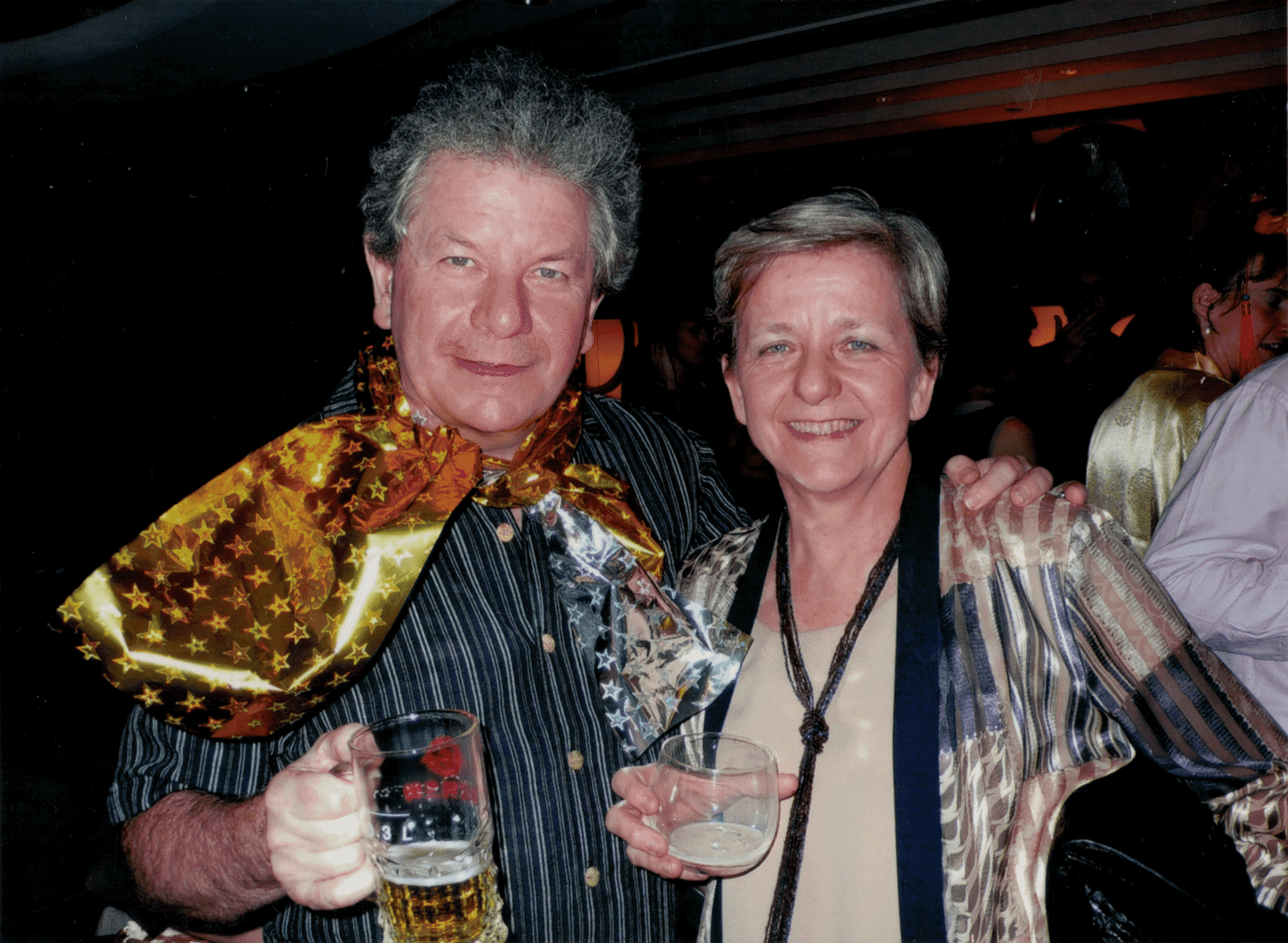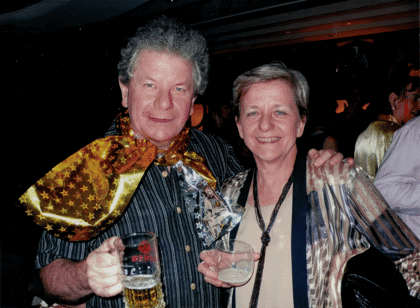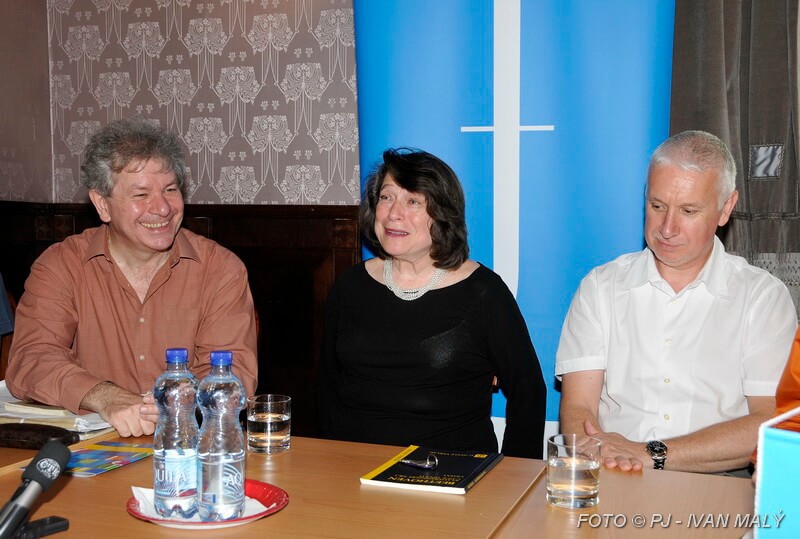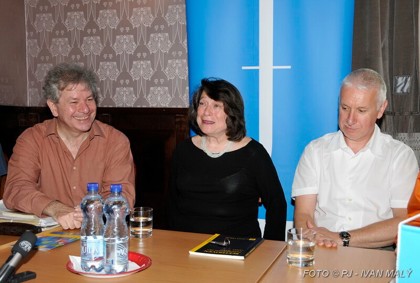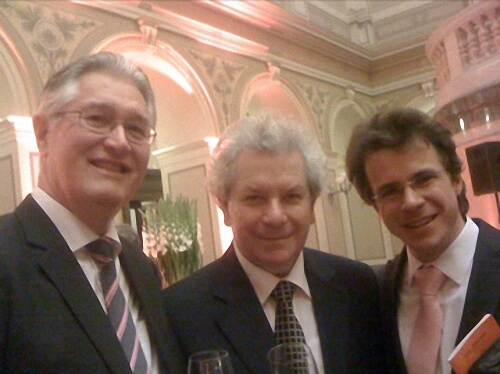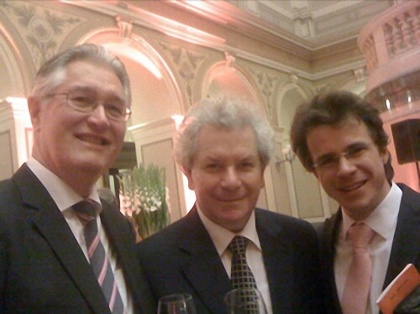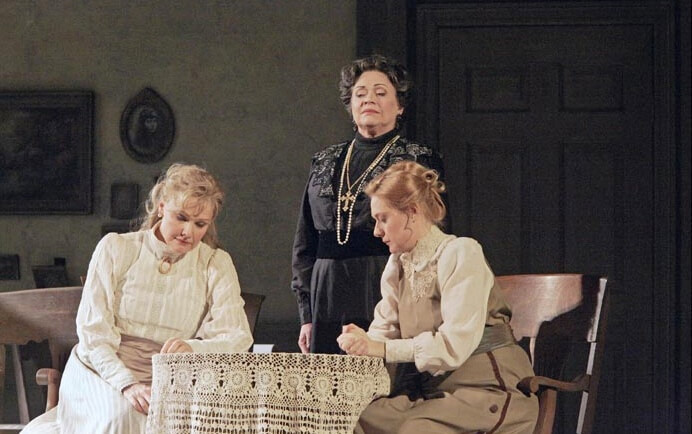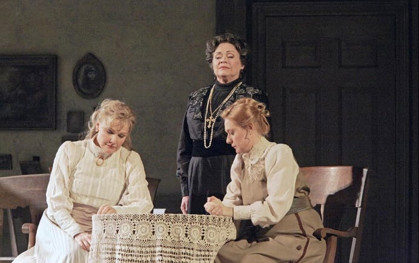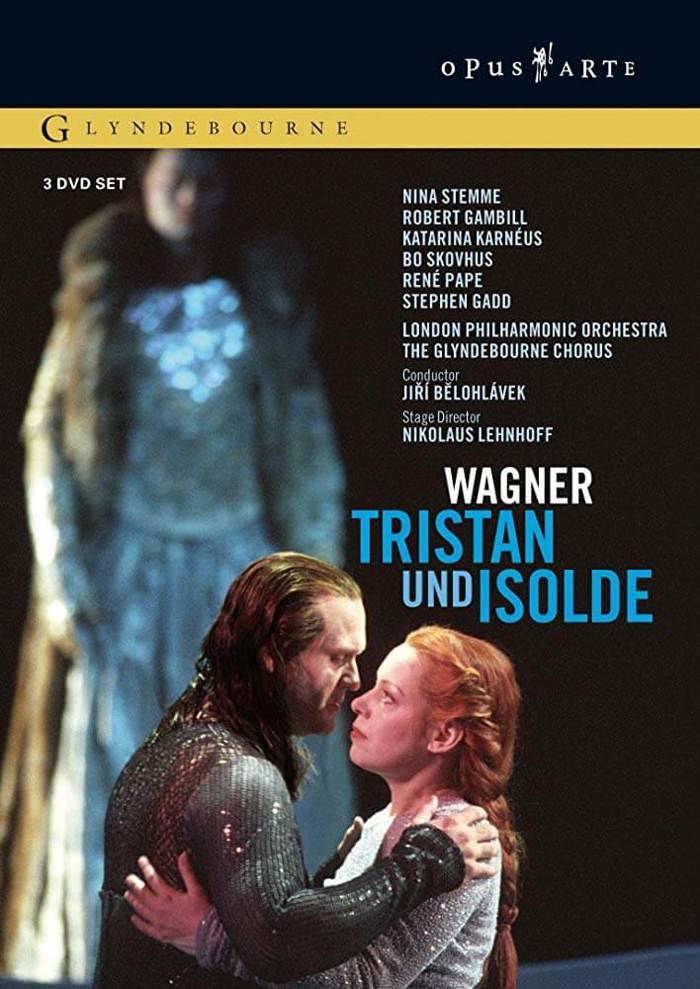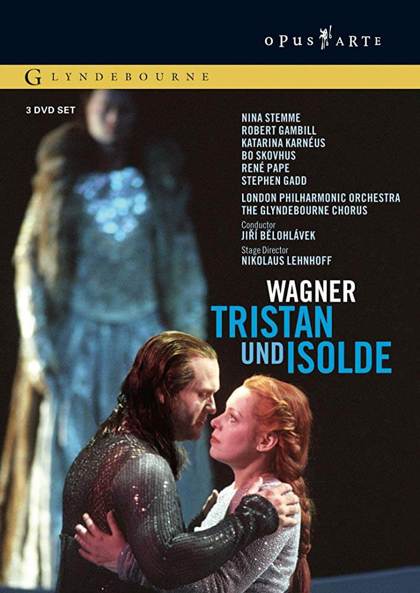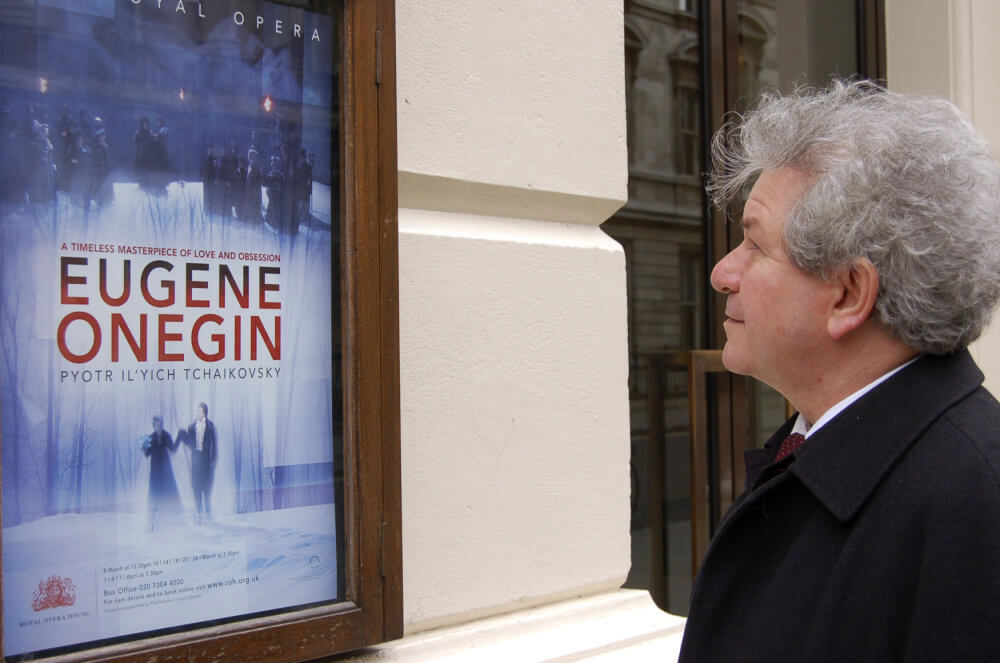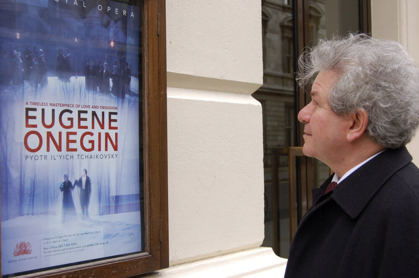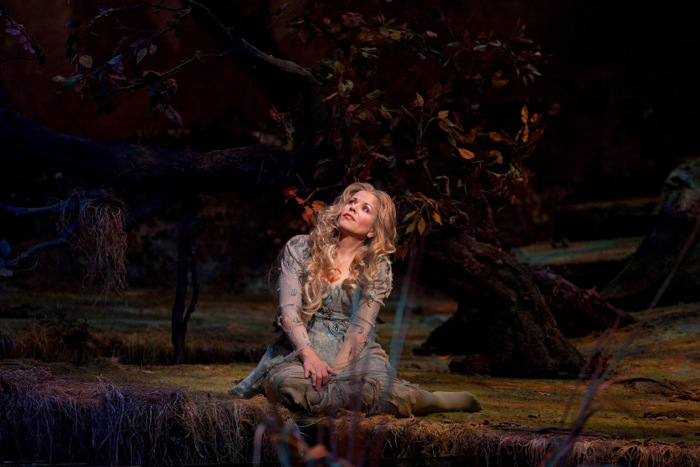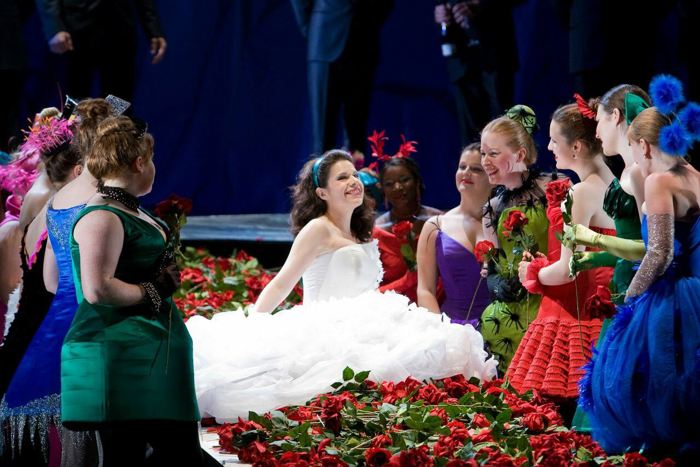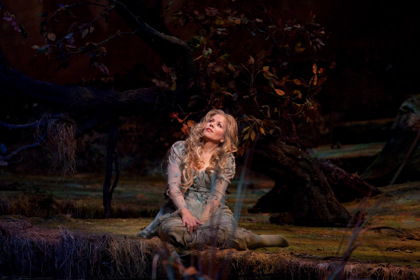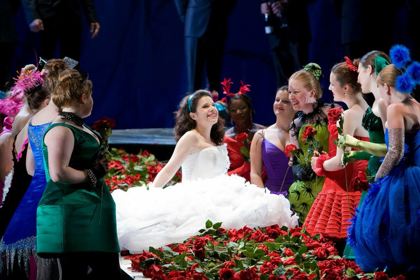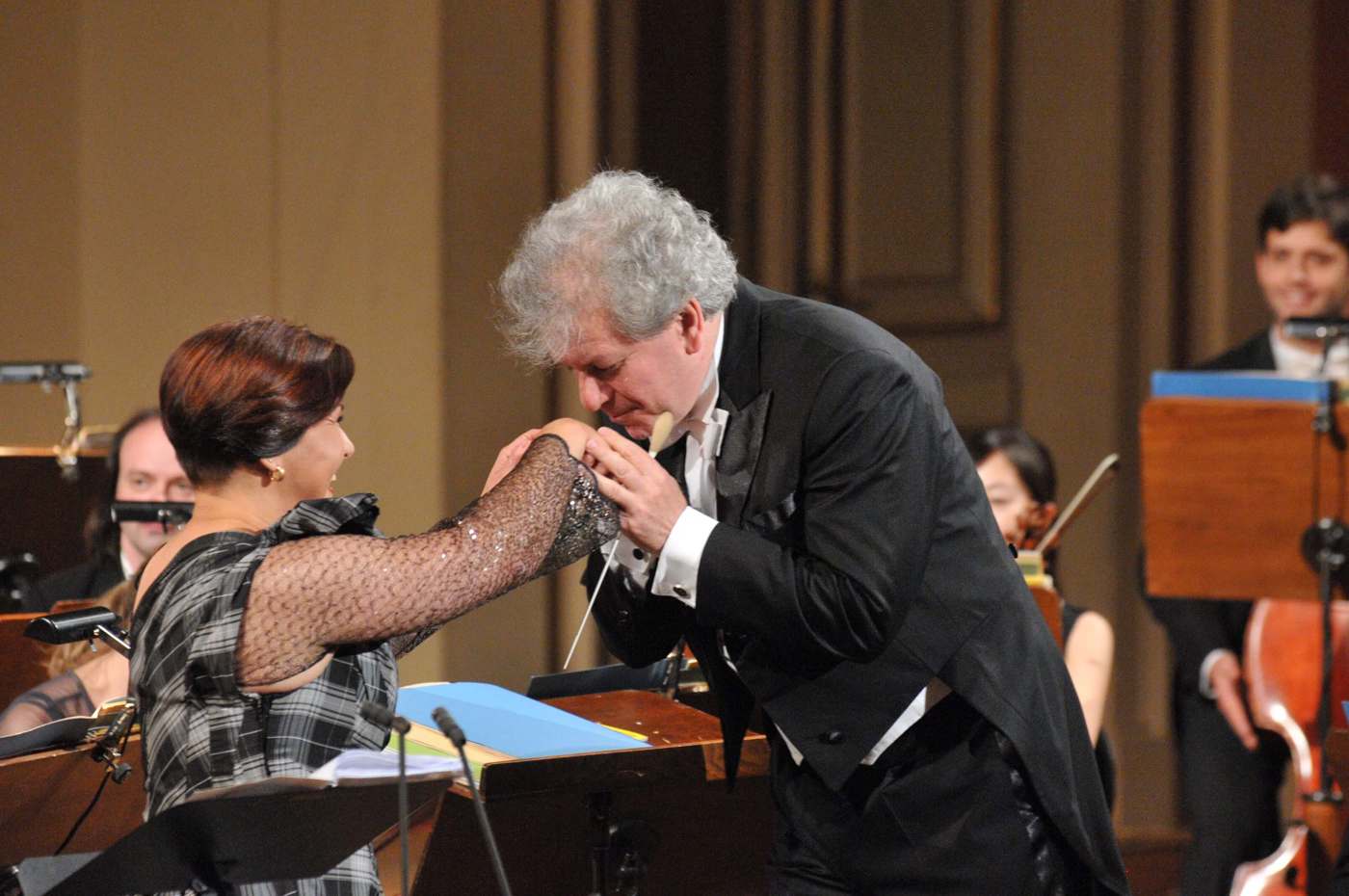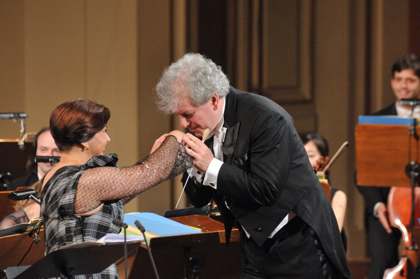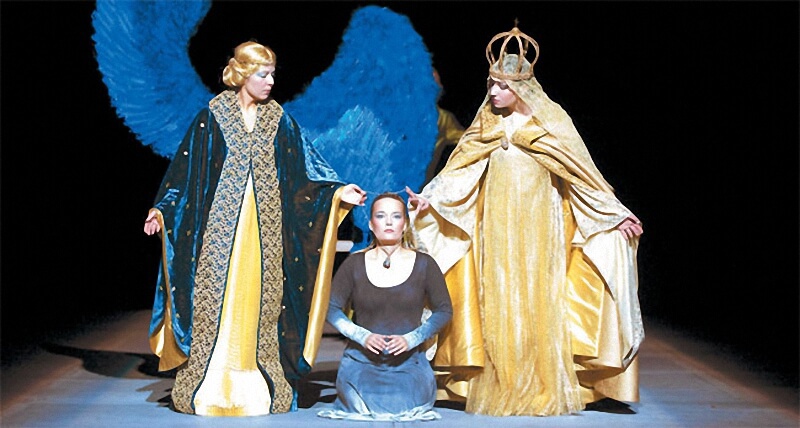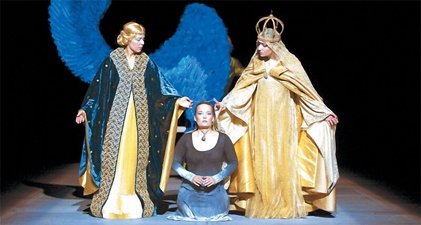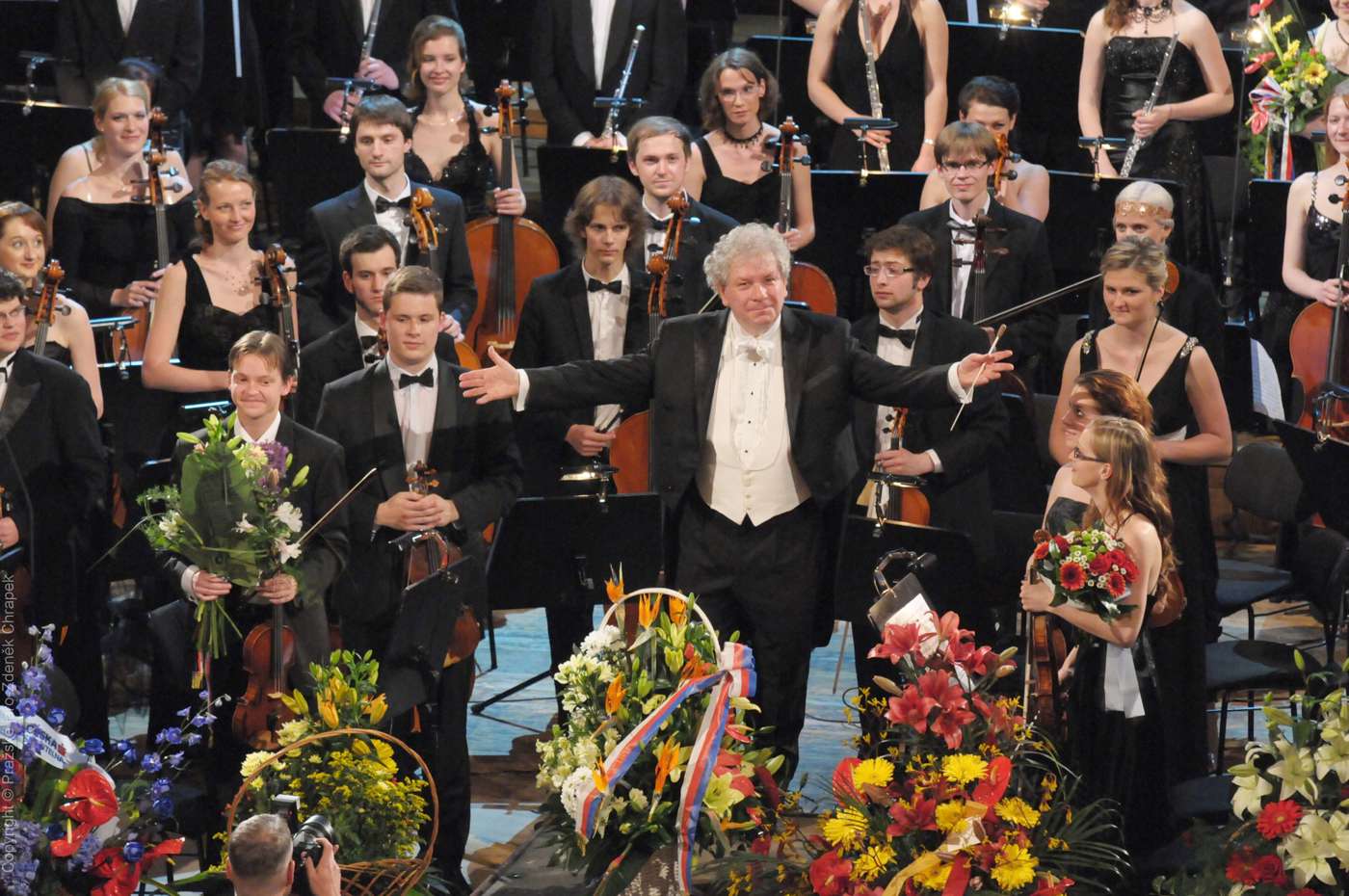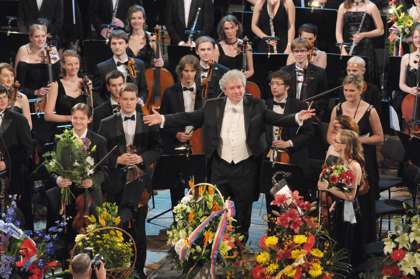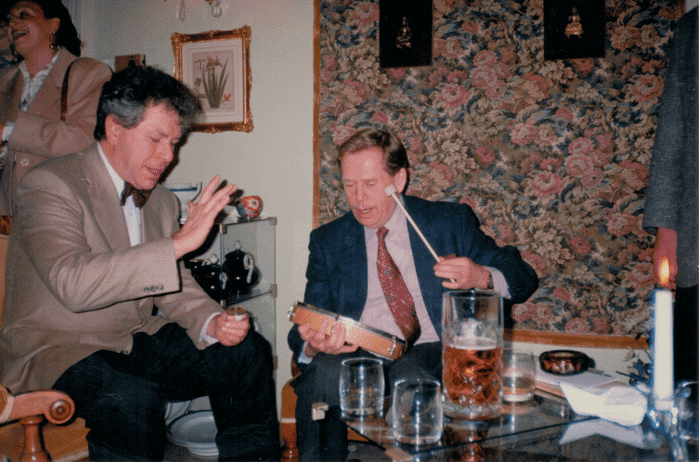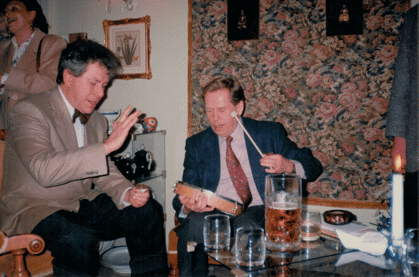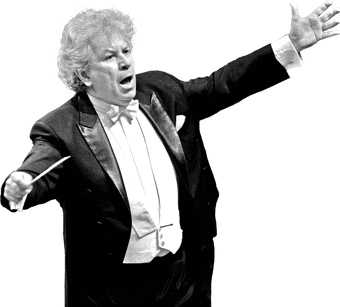„I lived in London for many years – on top of being the Chief Conductor of the BBC Symphony Orchestra for the last six years, I have collaborated with many other British orchestras and opera houses since 1995 and I can say that I have always felt at home there.“
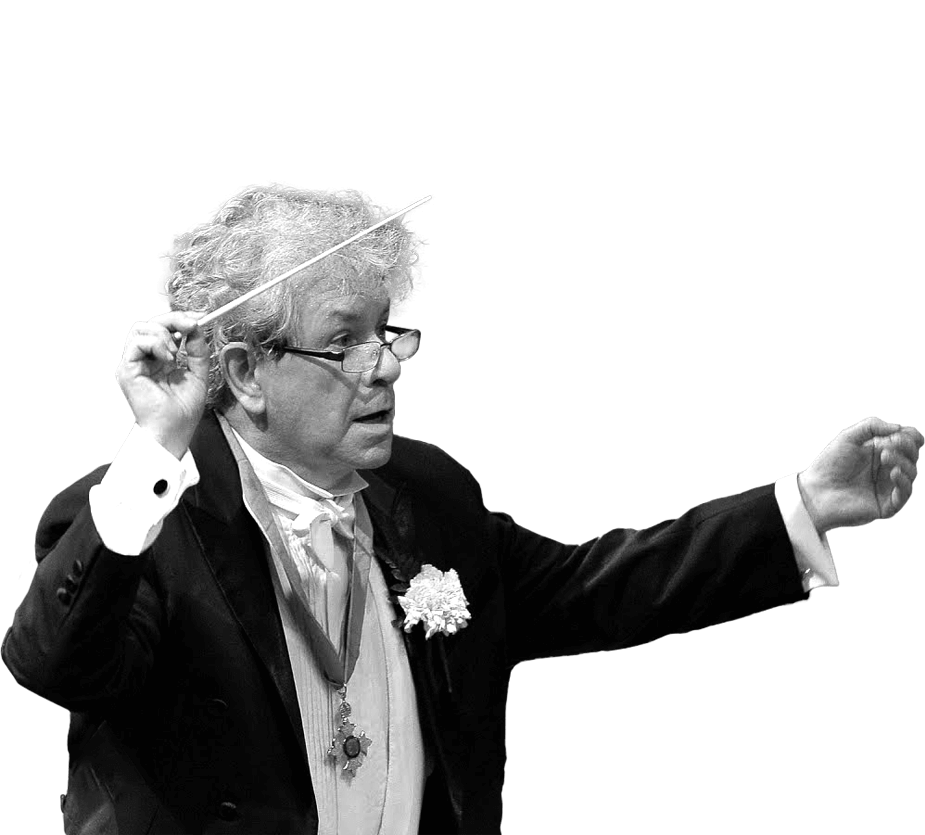
An Ambassador of Czech Music in England and in the world
Although Bělohlávek’s main focus in the 1990s and early 2000s was the Prague Philharmonia where he was Chief Conductor, it was also a time when he established contacts and developed collaboration abroad. One of his main destinations became the UK.
The British audience became acquainted with Bělohlávek in the mid-1980s when he conducted the Czech Philharmonic at the Celebration of Czech and Slovak Music Festival on 23 October 1985. Dvořák’s Sixth Symphony in D, op. 60 and Martinů’s Memorial to Lidice were on the programme. [ 2 ] In 1988 he was a guest conductor in Swansea with the BBC Welsh Symphony Orchestra and in 1989 with the BBC Philharmonic in Manchester. In 1991 he made a major tour with the Czech Philharmonic which was dedicated to the 150th anniversary of Dvořák’s birth. Beside Bělohlávek as Chief Conductor, the conductor Libor Pešek also took part in the tour. The concerts were held in Glasgow, Nottingham, Cardiff, Leeds, Dublin and three times at London’s Barbican Hall. Two concerts of 24 and 25 September at the Barbican were conducted by Bělohlávek featuring Dvořák’s overture Othello, Cello Concerto and Sixth Symphony in D.
Two years later, on 2 October 1993, Bělohlávek conducted the opening concert of the Czech Festival at the Royal Festival Hall where the Czech Philharmonic performed Smetana’s Má vlast (My Fatherland). He conducted two more concerts within the same festival on 19 and 26 October 1993.
The high quality of his performance led to numerous offers of guest conducting and therefore Bělohlávek collaborated in the following years with the BBC Philharmonic, the London Philharmonia Orchestra, and the BBC Symphony Orchestra. With the last orchestra he performed two concerts in January 1995: Mozart’s Sinfonia Concertante and Martinů’s Epic of Gilgamesh featuring Eva Urbanová, Ľudovit Ludha, Dalibor Tolaš, Peter Mikuláš, Jack Shepherd and the BBC Choir on 28 January; and on 31 January Dvořák’s Serenade in d, op. 44, Mozart’s Piano Concerto no. 23 played by Ivan Moravec and Suk’s Serenade in E flat, op. 6.
The level of mutual understanding with the BBC Symphony Orchestra was extraordinary already at first meetings: “My first contact with the orchestra suddenly created a very close professional symbiosis that implied further contacts. And the orchestra’s management rose to the occasion and invited me as their principal guest conductor.” [ 3 ]
Already in September 1995, Bělohlávek became Principal Guest Conductor of the BBC Symphony Orchestra with a contract for three years. Practically, it meant work in the studio, tours, four concerts at the Royal Festival Hall (and later at the Barbican Hall) and two concerts at the Proms every season.
In the first season, Bělohlávek focused on Czech music, however, not on the best-known pieces such as Vltava or the New World Symphony, but pieces that had not been performed in the UK for a long time or ever (Dvořák’s symphonic poems, Janáček’s Taras Bulba, various compositions by Martinů) and works by contemporary Czech authors (Petr Eben’s Nocturne and compositions by Luboš Fišer and Ivan Kurz). In the following seasons he would combine the Czech repertoire (Fibich, Novák, Suk, Smetana) with works of other composers (Shostakovich, Brahms, Schubert, Mahler, Mendelssohn-Bartholdy and more).
Bělohlávek played a key role in including the work of Bohuslav Martinů into London’s Festival of Twentieth Century Music organized every year by BBC Radio. In 1998 the festival’s focus was the musical legacy of Bohuslav Martinů, and its rich programme offered concerts, lectures, panel discussions, exhibitions and master classes given by Ivan Štraus and Bělohlávek. Two concert performances of the opera The Greek Passion by the BBC Symphony Orchestra with Bělohlávek crowned the whole festival.
Bělohlávek promoted Czech music not only by performing the music of Czech composers, but also by inviting Czech and Slovak musicians to perform in London. Already at the very first concert as Principal Guest Conductor on 1 February 1996 at the Royal Festival Hall, he performed Martinů’s Fourth Piano Concerto with Igor Ardašev. Later that year in August, he invited Ivan Kusnjer to perform Dvořák’s Te Deum and Martinů’s Field Mass. The pianist Jan Simon joined Bělohlávek on 13 November 1997 to play the Piano Concerto No. 1 by the Prague composer and pianist Erwin Schulhoff.
Czech repertoire could be heard also at Bělohlávek’s master classes at the prestigious summer school and festival in Dartington in southwest England that combined professionals and amateur enthusiasts. Bělohlávek was a guest here three times. In 1999, a Czech Week was organized within the festival with masterclasses of the Panocha Quartet and the final concert conducted by Bělohlávek.
As both the orchestra and the conductor were satisfied with the collaboration, the BBC SO renewed the contract for another three years until the end of 2000. Bělohlávek was pleased with the good relationship he had with the orchestra and in one interview he said: “The orchestra has a reputation of an obstinate, not exactly submissive ensemble with complicated relationships. However, I have never felt this myself, we have always been on very friendly terms, despite me being exacting and never coming down from my requirements of high quality. Maybe that’s what they appreciated.” [ 4 ]
Even after the contract ended, Bělohlávek continued to collaborate with the orchestra regularly once or twice a year. In May 2002 at the Barbican Concert Hall, they performed together Schoenberg’s sextet Verklärte Nacht and Mahler’s Song of the Earth with the German mezzosoprano Petra Lang and the tenor Keith Lewis from New Zealand. In July 2002 they performed together works by Stravinsky, Schumann, Brahms and Dvořák at a festival in Bad Kissingen. In August 2004, they performed Janáček’s Sinfonietta and Dvořák’s Spectre’s Bride at the BBC Proms, with Anda-Louise Bogza (soprano), Peter Straka (tenor), Ivan Kusnjer (bass-baritone) and the BBC Symphony Chorus.
As did the chorus! The BBC Symphony Chorus really relished singing this music, much of which either repeats or previews the bass’s contribution, almost as a reinforcing commentary. I wondered how many of the Chorus had sung in the previous Proms performance in 1991 under Gennadi Rozhdestvensky, memorable for the drive, energy and overt theatricality that Rozhdestvensky brought to the piece. Under Bĕlohlávek The Spectre’s Bride was rather more subtly presented – more a morality tale than a gothic horror – an equally valid presentation, and maybe the more authentic. Certainly under Bĕlohlávek the beauty of the orchestration and the many original orchestral touches were beautiful. Again the woodwinds, particularly the oboist, showed their considerable prowess.
A sbor také! Sbor symfonického orchestru BBC si skutečně užíval tuto hudbu, která z velké části následuje nebo předjímá basový part formou jakéhosi podpůrného komentáře. Přemítal jsem, kolik ze zpěváků sboru asi zpívalo již v předchozím provedení této skladby na Proms v roce 1991 pod Gennadijem Rožděstvenským, které se do paměti zapsalo vervou, energií a zjevnou teatrálností, s nimiž Rožděstvenskij k dílu přistupoval. Pod Bělohlávkovým vedením byly Svatební košile decentnější – spíše ve stylu pohádky s ponaučením než gotického hororu, což je rovnocenné, a možná i autentičtější, pojetí. Každopádně byly pod Bělohlávkem jak krása orchestrace, tak mnohá originální pojetí ze strany orchestru, nádherné. Dřevěné dechové nástroje, a zejména hoboj, ukázaly mimořádné mistrovství.
In the middle of 2004, Bělohlávek received the offer to become the chief conductor. The BBC SO orchestra management had been looking for a candidate with the help of a ten-member committee including three orchestra members for a year and a half already. Out of all short-listed candidates, the whole committee suggested Bělohlávek. He met all the requirements – he had an excellent international profile, a wide-ranging repertoire including contemporary music, experience with long-term work with one ensemble, he did not behave like a super-star, was affordable and, last but not least, he was very popular with members of the orchestra. In London, he won everyone’s favour by his modest and unpretentious behaviour.
After six months of negotiations in which the conductor and the management clarified mutual expectations, Bělohávek gladly accepted. In February 2005, the new chief conductor of the BBC Symphony Orchestra was announced. Bělohlávek had a task before him that he described in an interview: “…six visits a year, with public concerts, studio sessions, tours and Proms. I think it's quite a strong load. It's not overwhelming to the extent that it would make impossible my involvement in opera and some guest conducting, but it is a fair chunk of the work that the orchestra does.” [ 6 ]
Bělohlávek's decision to take up the post was made easier by the fact that he had no long-term commitments with another orchestra for the following years. The offer from the BBC came shortly after his resignation from the post of music director and chief conductor designate of the Slovak Philharmonic Orchestra, which he held in the 2003/2004 season. He resigned following disagreements with the Ministry of Culture of Slovakia which had failed to provide the promised financial support.
Bělohlávek became the twelfth chief conductor in the history of BBC SO. He was appointed for three years, and his agenda included planning the repertoire and tours abroad, deciding about staff and orchestra members, and of course enhancing the orchestra’s sound quality.
Since its foundation, the orchestra’s mission was twofold: to focus on and promote contemporary music and in this way support contemporary composers from Britain and elsewhere and to provide a meeting point for various contemporary musical directions on the one hand; and to cultivate the art of interpretation of traditional repertoire on the other. The latter was Bělohlávek’s main task – to take care of and enhance the interpretation of classical, romantic and twentieth century music with an emphasis on Czech music and to develop the orchestra’s sound quality: “We will be trying to raise the standards of playing even higher.” [ 7 ]
Bělohlávek was of the opinion – and not only in connection with the BBC SO – that ensemble, work of orchestra sections, phrasing and melody lines, colours and contrasts can be best studied on Brahms, Bruckner, Mahler or Strauss.
They had known me as an interpreter of mainstream repertoire and so they wanted me to focus on repertoire of world-famous authors that is, however, not performed very often. My task was to create a cleansing island that would purify the tonnes of musical material performed there. A Brahms symphony is always a feast everyone looks forward to. And from time to time I was to include music of English authors.
Within the area of Czech music, Bělohlávek could focus on wider presentation of Czech authors than he could when he had been guest conducting. All Martinů’s symphonies, major works by Josef Suk and symphonic, chamber and opera pieces by Dvořák and Smetana were included in the following seasons.
Apart from the Czech focus, Bělohlávek presented music of other composers. He often included the music of Beethoven, Mahler, Haydn, Russian romantics, and English composers. Elgar’s Cello Concerto and the concert overture In the South grew especially close to his heart. He also premiered works of contemporary music, one of which was Michael Tippett’s Fantasia Concertante on a Theme of Corelli for strings that Bělohlávek especially liked and performed on a tour in China, or Jonathan Dove’s Hojoki based on the meditations of a medieval Japanese monk or John Tavener’s Beautiful Names inspired by the ninety-nine names of God in the Quran.
In the 2005/2006 season, Bělohlávek had the title Principal Conductor Designate and performed frequently with the orchestra so that the collaboration was not so different from an actual “chief conducting” season. On 22 October 2005, Bělohlávek had the inauguration concert at the Barbican which attracted unprecedented media attention. The programme was bold – the British premiere of Elliott Carter’s Reflexion, Beethoven’s Piano Concerto no. 5 in E flat with Emanuel Ax, Strauss’s tone poem Death and Transfiguration and Stravinsky’s Symphony of Psalms. The performance was well received, and many reviews saw it as a great promise for the future.
Officially, Bělohlávek became Chief Conductor at the opening concert of the BBC Proms on 14 July 2006 featuring overtures and arias from Mozart’s Don Giovanni and The Marriage of Figaro, Smetana’s Vltava, Dvořák’s Te Deum and Shostakovich’s Symphony no. 5. Bělohlávek had three more concerts at the Proms that year, the second of which was truly special as it celebrated the eightieth birthday of Queen Elisabeth II who was present together with her husband Prince Philip. They performed the world premiere of Peter Maxwell Davies’s composition A Little Birthday Music, Mozart’s Clarinet Concerto in A major and Dvořák’s Ninth Symphony.
Bělohlávek toured Asia with the BBC SO in the autumn of the same year. They visited South Korea, China, Singapore, and Malaysia. The ten concerts featured a varied programme including works by Dvořák, Elgar, Janáček, Smetana, Shostakovich, Mozart and Richard Strauss.
Their first concert in 2007 featured the concert performance of Janáček’s opera The Excursions of Mr. Brouček. The cast was Czech and Slovak: the role of Matěj Brouček was performed by Jiří Vacík and other roles by Peter Straka, Maria Kobielska (Haan), Lenka Šmídová, Roman Janál and Aleš Briscein. A recording of this concert was released in January 2008 on Deutsche Grammophon and was as well received as the concert itself. The CD got an award from Gramophone magazine and the MIDEM Classical Award 2009 at the international music fair in Cannes.
Bělohlávek is at home here in a lively account of a lovable opera …a lovable work it is. The first excursion in particular is packed with vivid invention; the second dips deeper into wells of Czech history. It all needs the sharp hand and light touch with the agile rhythms which Bělohlávek brings to it.
Bělohlávek je zde ve svém živlu a přináší vzrušující podání této rozkošné opery… tato opera je vskutku rozkošná. Zejména první výlet je naplněn svěží invencí, druhý nahlíží do hlubokých studní českých dějin. K tomu jsou zapotřebí jasná gesta a lehkost v rychlých rytmech, což Bělohlávek přináší.
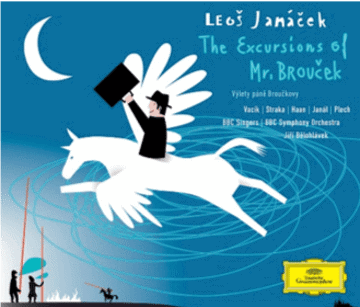
The following concert with the BBC Symphony Orchestra was operatic as well. On 17 March 2007, overtures and arias from operas by Mozart, Rossini, Wagner, Tchaikovsky, Berlioz and Glinka sounded in the Barbican Concert Hall. Vocalists and instrumentalists were international: the guitarist Richard Simpson, Welsh bass-baritone Bryn Terfel, English mezzosoprano Sarah Connolly and clarinettist Richard Hosford.
In the summer of 2007, Bělohlávek appeared at the Proms again and conducted the opening concert on 13 July, two concerts in August and the Last Night of the Proms on 8 September. One of the concerts in August featured Czech music – Martinů’s Piano Concerto no. 4 performed by Ivo Kahánek. In the one hundred and eleven years of the Proms, Bělohlávek had been the first conductor whose native tongue was not English who was asked to conduct the Last Night of the Proms. Traditionally, the conductor gives a speech within the concert and Bělohlávek even included a short salutation in Czech: „Speciální pozdrav posílám všem mým drahým v Čechách, na Moravě a na Slovensku.“ (“I am sending a special greeting to all my dear ones in Bohemia, Moravia and Slovakia.”) The varied programme consisting of instrumental pieces and opera arias was dominated by Anna Netrebko. Her rendition of the song Meine Lippen sie küssen so heiss (My lips kiss so hot) from Franz Lehár's last operetta Giuditta was literally captivating and Netrebko, in addition to her phenomenal singing, also showed her talent for expressive acting.
Shortly before the Last Night of the Proms, General Manager of the BBC Symphony Orchestra Paul Hughes announced the extension of Bělohlávek’s contract until 2012. This was a clear recognition of Bělohlávek's work and good relationships with the orchestra members.
With further tours planned, and recordings on labels such as Deutsche Grammophon, Chandos and Harmonia Mundi, we are delighted that Jiří has agreed to extend his contract through to the summer of 2012. He is a world-class musician and his partnership with the orchestra and chorus goes from strength to strength.
Máme obrovskou radost, že Jiří souhlasil s prodloužením smlouvy do léta 2012, turné a nahrávání pro značky jako Deutsche Grammophon, Chandos a Harmonia Mundi jsou již naplánovaná. Mezi hudebníky patří Jiří k naprosté světové špičce a jeho spolupráce s orchestrem i sborem vede od úspěchu k úspěchu.
For me it was very satisfying to learn that while we are still in my first year as Chief Conductor of the BBC Symphony Orchestra the players and management have decided to ask me for a second term. When I look back over the past 13 months, I am pleased that we have clearly started our new relationship very successfully and our common work is already bringing distinctive results.
Byl jsem velmi potěšen, když už v prvním roce mého angažmá šéfdirigenta BBC Symphony Orchestra se hráči a vedení orchestru rozhodlo mne požádat o druhé období. Ohlédnu-li se za posledními 13 měsíci, mám velkou radost, že jsme tento nový vztah zahájili tak úspěšně a že naše společná práce již nese kvalitní ovoce.
At BBC SO concerts in December, another Czech composer was presented. Bohuslav Foerster’s Violin Concerto in d minor op. 10 was performed on 4 December and his Violin Concerto no. 1 in c minor op. 88 four days later. Ivan Ženatý played the solo part.
I am always very pleased when a project featuring unknown or less popular music receives extraordinary acclaim. The last time I experienced this was in December last year when we performed Foerster’s violin concertos with Ivan Ženatý in London: the process of studying and accepting the works was not easy, but in the end the soloist’s enthusiastic input convinced the players in the orchestra and the audience alike.
As is the habit with the BBC SO, both concertos were recorded and in co-operation between the BBC Radio 3 and the Czech label Supraphon released on a CD in 2008.
Ivan Ženatý has found his niche here, his interpretation is truly captivating. The outcome could not have been any other than excellent since the conductor was Jiří Bělohlávek. The orchestra confirmed again, as at the Prague Spring 2008, that they found an inner understanding of Czech music thanks to their chief conductor.
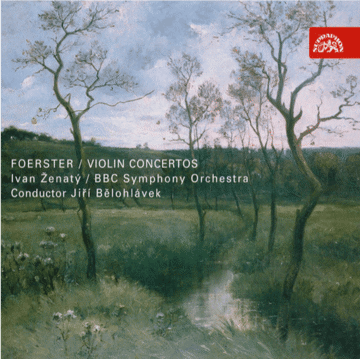
In the spring of 2008, Bělohlávek and the orchestra went on tour of Continental Europe. They toured Germany with stops in Mannheim, Hannover, Hamburg, Düsseldorf, and Cologne. They also gave two concerts at the Prague Spring Festival. On 31 May they played Miloslav Kabeláč’s Seventh Symphony, Beethoven’s Piano Concerto No. 1 performed by Elisabeth Leonskaja, Shostakovich’s Symphony No. 6, and as encores Britten’s Storm interlude from the opera Peter Grimes and Dvořák’s Slavonic Dance in A flat major. On the following day, 1 June 2008, the programme included Britten's Sinfonia da Requiem, Op. 20, and Suk's Asrael, which was a clear choice for Bělohlávek - it is one of the greatest symphonic works of Czech music, extremely beautiful and at the same time a show-off piece of orchestral qualities. Skočná from Smetana’s Bartered Bride, one of Dvořák's Slavonic Dances and Elgar's March No. 1 were on the encores list.
Both concerts and their performers had received great publicity and everyone had been awaiting the concerts with great expectations. And these expectations were satisfied and even surpassed by Bělohlávek and the orchestra.
The BBC Symphonic Orchestra earned long and loud standing ovations at the Prague Spring. (…) Both concerts were lessons in discipline, respect and mutual understanding within the orchestra and with the conductor. (…) They played their “native” Sinfonia da Requiem by Britten in an excellent way, but what was truly noteworthy and historic was their performance of Suk’s Asrael. (…) The British orchestra under Bělohlávek’s baton played it with such thoroughness, compactness and emotionality that the audience was mesmerized.
The British musicians had also other plans in Prague than music. On Sunday morning, selected members of the BBC Symphony Orchestra took on the Czech Radio Symphony Orchestra in a football match. Teams consisting of five players and a goalkeeper on each side fought on the artificial turf of the TJ Hanspaulka field. The Czech Orchestra won 5:1. Such a football match was a unique event in the history of the Prague Spring Festival.
The summer months belonged again to the Proms, where Bělohlávek conducted four concerts. The opening concert on 18 July offered works by Richard Strauss, W. A. Mozart, O. Messiaen, L. van Beethoven, Elliott Carter and A. N. Scriabin. On 23 July they played Felix Mendelssohn-Bartholdy and Johannes Brahms. In August, they performed the first series of Dvořák's Slavonic Dances and, in the second part of the concert, a concert performance of Janáček's opera The Fate with Štefan Margita in the role of the composer Živný. On 31 August, Verdi's Requiem was performed at the Royal Albert Hall.
One of the memorable concert events of 2009 was the performance of Suk’s Fantasy for Violin and Orchestra with Ivan Ženatý, Mahler’s Lieder with Dagmar Pecková and Dvořák’s Ninth Symphony in January.
In March 2009, a concert performance of Martinů’s opera Julietta at the Barbican was recorded by BBC Radio 3 and broadcast on 31 March in the UK and on 6 April by the Czech Radio (Vltava). The role of Julietta was sung by Magdalena Kožená and of Michel by William Burden. The performance was very well received, and the reviewers did not spare words of praise especially for Jiří Bělohlávek and Magdalena Kožená. The extraordinary impression the concert made is testified by the fact that in 2010 the BBC SO received the Royal Philharmonic Society Music Award in the opera and musical theatre category for it. It became the first orchestra ever to be awarded in this category.
Juliette, however, is not an opera whose potential would be realised without a conductor who believes in its music and there could be no more sympathetic advocate than Jiří Bělohlávek, who caught its strangely distanced intensity almost to perfection while not neglecting its capacity either for overt humour or disarming naïveté.
Julietta však není operou, jejíž potenciál by bylo možné naplnit bez dirigenta, který zcela této hudbě věří. A nemůže být propagátora s hlubším pochopením, než jakým je Jiří Bělohlávek, jenž téměř dokonale zachytil zvláštně rezervovanou intenzitu této opery, aniž by opomíjel její zjevný humor na jedné a odzbrojující naivitu na druhé straně.
The 2009/2010 season was significant as far as the promotion of Martinů’s work is concerned. Bělohlávek performed all six of Martinů’s symphonies which was the first time ever the complete set had been performed in front of the British audience. The series began with Symphony No.1 on 3 October 2009 and finished seven months later, on 8 May 2010 with Symphony No. 6 performed at the Barbican Centre. All the performances were highly praised and were among the highlights of Bělohlávek’s promotion of Czech music in England.
The piece won an ovation in this performance, which was marked by consistently virtuosic playing from the orchestra and a sense of easy command from Bělohlávek that typifies his control over the music of his homeland. You would have to look long and hard to find this level of advocacy for any composer.
Skladba si vysloužila mimořádné ovace, její provedení bylo charakterizováno konzistentně virtuózní hrou ze strany orchestru a pocitem naprosto samozřejmého a zvládnutého vedení ze strany Bělohlávka, jak je pro něj typické, když diriguje hudbu ze své vlasti. Museli byste hodně dlouho hledat, abyste narazili na někoho, kdo se zasazuje o dílo nějakého skladatele na této úrovni.
Live recordings of all the concerts were used for a set of three CDs released on the Onyx label in September 2011. The extraordinary quality of the CD set called Martinů The 6 Symphonies was confirmed by several nominations and awards. It was even short-listed for the Grammy Award in February 2012, and in September 2012 it received the Gramophone Award for the best orchestral recording.
You won't find a more persuasive champion than Bělohlávek, who has the music in his blood. His skill at unravelling Martinů's rhythmic and textual knots-evidenced time and again in these live performances by the BBC Symphony Orchestra-is such that you immediately sense the statue of the music. The best place to start is the Fourth Symphony: in Bělohlávek's hand it sizzles – especially the Allegro vivo, a motorised march that generates fabulous momentum.
Nenajdete přesvědčivějšího propagátora než Bělohlávka, který má tuto hudbu v krvi. Má ohromnou dovednost rozmotávat rytmické a zápisové uzly typické pro Martinů tak, že stavba skladby je ihned zřetelná – což je z těchto živě nahrávaných provedení BBC Symphony Orchestra patrné. Pro začátek doporučuji čtvrtou symfonii: pod taktovkou Bělohlávka přímo soptí – zejména část Allegro vivo, jakýsi motorizovaný pochod, který má úchvatný spád.
Magic always happens when Bělohlávek conducts the BBC Symphony Orchestra in Czech works...this set of Martinů’s six symphonies, taken from Barbican concerts last season, overflows with the same qualities that make the music so endearing: heart-warming ebullience, visionary fantasy, soaring passion, the most piquant orchestral colours.
Když Bělohlávek diriguje česká díla se Symfonickým orchestrem BBC, stane se vždy cosi magického … tento komplet šesti symfonií Bohuslava Martinů, nahraný živě minulou sezónu z koncertů v Barbican Centre, doslova přetéká všemi přednostmi, které tuto hudbu činí tak poutavou: životní jiskrou, jež nás zahřeje u srdce, vizionářskou představivostí, vášnivostí i nejrozmanitějšími orchestrálními barvami.
Martinů's symphonies tend to divide opinion and have not enjoyed anything like the same exposure as those of his Czech predecessor, Dvořák. But if anyone can find the key to their language, it is Jiří Bělohlávek. These fine-tuned, dynamic performances by the BBC Symphony Orchestra stem from a 2009, 10 series at the Barbican. Doubters about the music perhaps need not apply, but there is plenty of freshness, verve and expressive wisdom on this set.
Symfonie Bohuslava Martinů vzbuzují rozdílné reakce a rozhodně nejsou zdaleka přijímány tak jako symfonie skladatelova českého předchůdce Dvořáka. Ale jestli existuje někdo, kdo k nim dokáže najít ten správný klíč, pak je to Jiří Bělohlávek. Tyto krásně laděné, dynamické nahrávky BBC Symphony Orchestra vycházejí z koncertů nahraných v Barbican Centre v sezóně 2009/2010. Těch, co o této hudbě pochybují, se to možná nedotkne, ale nahrávky přinášejí ohromnou svěžest, vervu a výrazovou moudrost.
Apart from the four concerts that he conducted, Bělohlávek had a new role at the Proms 2009. At the Last Night of the Proms on 12 September he became one of the players. However, his instrument was not the cello, as would seem logical considering his studies at the Prague Conservatoire, but a vacuum cleaner. The second half of the evening was opened by Malcolm Arnold’s A Grand, Grand Overture for three vacuum cleaners, one floor polisher and four rifles. Bělohlávek, the violinist Jennifer Pike and pianist Stephen Hough took up the parts of the vacuum cleaners, and Sir David Attenborough played the floor polisher. The BBC Symphony Orchestra and the soloists were conducted by David Robertson.
A recording of all five of Beethoven’s Piano Concertos with Paul Lewis and the BBC Symphony Orchestra for the Harmonia Mundi label were a significant musical event of the 2009/2010 season. The concertos were recorded in July and November 2009 and March 2010 at BBC Maida Vale Studios and Air Studios in London. The three-CD set was released in July 2010. On it, one can hear the orchestra with two protagonists for whom interpretation is a service to the composer and music itself and not a showy manifestation of their own musical abilities.
Jiří Bělohlávek (…) is well known as a fine opera conductor, a role in which he has mastered well the art of supporting and cooperating with the soloists, a role that serves him well in this instance. They work very well together. Their interpretation of these works is obviously a collaborative effort. There is no one here trying to upstage the other. By communicating so well with each other, they also communicate well with us. Their playing is like a narrative, a story being told and flows as such. Beethoven's music is eloquent enough without the need of special effects or flashy gestures. This is Beethoven straight, no chaser. It is lyrical as well as dramatic. Poetic as well as technical. A very fine traversal indeed of Beethoven's masterworks for piano and orchestra. That subtle problem with the previous recordings just came to me. They were saying: ‚Listen to me!‘. This one simply says: ‚Listen to the music!‘
Jiří Bělohlávek (…) je známý jako výborný operní dirigent, tuto roli mistrovsky zvládá ve vztahu k sólistům, kterým je citlivým partnerem a oporou, a to se mu skvěle hodí i v tomto případě. Dirigent a sólista skvěle spolupracují. Interpretace těchto děl je na první pohled výsledkem jejich společného úsilí. Ani jeden se nesnaží strhávat pozornost na sebe. Komunikují skvěle mezi sebou, a tím pádem i s námi. Jejich hra je jako vyprávění a také jako příběh plyne. Beethovenova hudba je výmluvná sama o sobě a nepotřebuje žádné zvláštní efekty nebo okázalá gesta. Tohle je čistý Beethoven bez přísad. Lyrický i dramatický, poetický i technický. Skutečně nádherné provedení Beethovenova mistrovského díla pro klavír a orchestr. Došlo mi, v čem byl skrytý problém dřívějších nahrávek. Ty nám totiž říkaly: „Poslouchej mě!“ Zatímco tato nahrávka říká: „Poslouchej tu hudbu!“
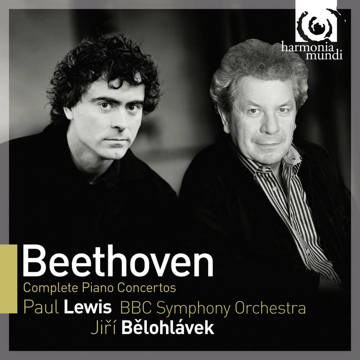
These are freshly considered, elegant and engrossing performances. (…) He brings a wonderful balance of integrity and imagination to his Beethoven playing. He does not dazzle you with virtuosity. His nimble and articulate finger work is always at the service of his musical ideas: to me the definition of good technique. While utterly respectful of the scores, he plays with such spontaneity that these familiar staples seem newly astonishing, qualities equally conveyed by Mr. Bělohlávek, the Czech-born chief conductor of the BBC Symphony, and his inspired players.
Tato provedení jsou svěží, elegantní a strhující. (…) Sólista do svého Beethovena přináší vyrovnanou míru ucelenosti a originality. Neomračuje nás svou virtuozitou. Jeho hbitý a artikulovaný úhoz je vždy ve službách hudebních nápadů – což je pro mne definice dobré techniky. Je sice zcela věrný zápisu, ale zároveň hraje s takovou spontánností, že i tato všeobecně známá hudba zní nově a překvapivě, k čemuž přispívá i šéfdirigent českého původu Jiří Bělohlávek a jím inspirovaní hráči BBC Symphony Orchestra.
So may I say at once that Harmonia Mundi’s eagerly awaited set is a superlative achievement and that Lewis’s partnership with Jiří Bělohlávek is an ideal match of musical feeling, vigour and refinement.
A tak mohu bez váhání říct, že toužebně očekávaný komplet vydaný nakladatelstvím Harmonia Mundi je naprosto mimořádným počinem a že Lewisova spolupráce s Jiřím Bělohlávkem je ideálním spojením citu pro hudbu, energičnosti a vytříbenosti.
In May 2010, Bělohlávek went on his second Asian tour with the BBC Symphony Orchestra visiting Japan, South Korea, China, and Taiwan. They played Tippett, Sibelius, Brahms, Mozart, Prokofiev, Debussy and Czech composers Smetana and Julius Fučík.
The summer was traditionally dedicated to the Proms. At the opening concert, Bělohlávek conducted Mahler’s monumental Symphony of a Thousand. On 21 July, Bělohlávek and Paul Lewis presented a part of their month-long work together when they played Beethoven’s Fourth Piano Concerto. On 8 August, Bělohlávek conducted Bruckner’s Seventh Symphony, and at the Last Night of the Proms on 11 September the orchestra, choirs and soloists (the soprano Renée Fleming and the violinist Maxim Rysanov) performed a whole range of shorter compositions including arias such as Měsíčku na nebi hlubokém from Dvořák’s Rusalka.
In May 2011, Bělohlávek introduced another Czech opera to the English audience. At London’s Barbican, they performed Smetana’s Bartered Bride. A live recording was made of the concert performance released in 2012 on the Harmonia Mundi label.
The real principals were conductor and orchestra. Radio listeners will have had every bit as good a time: from the sizzling overture on, every springing rhythm, every leaping line and tugging turn of polka, furiant and skočná whirled into virtuoso life in playing that propelled every passing emotion headlong to its exuberant conclusion.
Hlavními pilíři večera byli dirigent a orchestr. Rozhlasoví posluchači měli nepochybně také stejně skvělý zážitek: počínaje zpěněnou předehrou, přes mrštné rytmy, vzletné pasáže až po rázné kroky polky, furiantu a skočné všechno vířilo virtuózní hrou, která poháněla každou přicházející emoci vstříc rozvernému závěru.

Jiří Bělohlávek is not a flamboyant conductor who has the audience stamping and cheering, but his musical integrity and love of his native music shines through every note and phrase. The effect on the orchestra and cast is truly palpable.
Jiří Bělohlávek není okázalým dirigentem, jenž podněcuje posluchače k povzbuzování a tleskání, ale jeho hudební integrita a láska k hudbě jeho vlasti prosvítá skrz každou notu a frázi. Dopad, který to má na orchestr i zpěváky, je vskutku hmatatelný.
At the opening night of the 117th BBC Proms on 15 July 2011, Bělohlávek conducted Janáček’s Glagolitic Mass. The solo parts were sung by the soprano Hibla Gerzmava, mezzosoprano Dagmar Pecková, tenor Stefan Vinke and bass-baritone Jan Martiník. David Goode played the organ.
Much of the piece, though, is characteristically craggy, even austere, yet Bělohlávek's familiarity with its idiosyncratic style enabled him to produce a coherent and beautifully balanced performance, the inherent rough edges part and parcel of a scheme that was vividly personal and deeply felt. With pristine tone from the choir, a forthright team of soloists – Hibla Gerzmava, Dagmar Pecková, Stefan Vinke and Jan Martiník – as well as organist David Goode, commanding in his wild solo movement, it made a powerful impression.
Pro velkou část této skladby je charakteristická drsnost až strohost a přesto Bělohlávek, díky výborné znalosti tohoto svérázného díla, ji dokázal provést s uceleností a nádhernou vyrovnaností a zahrnout neodmyslitelné ostré hrany zcela přirozeně do hluboce osobního a procítěného plánu. Když se k tomu přidá andělsky znějící sbor, výrazné obsazení sólistů - Hibla Gerzmava, Dagmar Pecková, Stefan Vinke a Jan Martiník – a varhaník David Goode, který se s úctou chopil divoké sólové věty, tak to je skutečně silný zážitek.
Bělohlávek and the BBC Symphony Orchestra appeared once again at the 2011 Proms on 20 July with a programme of Dvořák’s Cello Concerto played by Jean‐Guihen Queyras and Smetana’s complete cycle Má vlast (My Fatherland) which was played without intermission.
In October, the conductor and his orchestra went on a tour of Spain with stops in San Sebastian, Pamplona, Zaragoza, Madrid, Valladolid and Bilbao. This was followed by a tour of Germany in November with concerts in Dortmund, Hamburg, Düsseldorf and Cologne.
In February 2012, they gave yet another concert performance of an opera, this time of Dvořák’s Jakobín. The singing cast was predominantly Czech and Slovak: Julia was sung by Dana Burešová, Bohuš by Svatopluk Sem and Jiří by Aleš Voráček. Jaroslav Březina, Lucie Fišer Silkenová, Aleš Jenis, Jozef Benci and Jan Martiník appeared in other roles. The performance received once again positive reviews, and one critic praised Bělohlávek’s contribution: “How fortunate we are in London to at last have a proper connection to Czech repertoire through Bělohlávek. His role in promoting Janáček, Martinů, Smetana, Suk, and Dvořák is inestimable, because his approach is so idiomatic, non-anglicized and extremely perceptive. We’re into a whole new era of appreciating Czech music.”
[ 27 ]
Towards the end of Bělohlávek’s position with the BBC SO, they together appeared once again in front of Czech audience. Similarly to 2008, they gave two concerts at the Prague Spring Festival 2012. The first of the two concerts consisted of compositions by Michael Tippett, Maurice Ravel, and of Suk’s Ripening in the second half.
The score on the verge of romanticism and modern music sounded with great expressiveness and lyricism at the same time, led by a firm hand toward an uncompromising form and a definite effect. It was obvious that nothing was random, unprepared or helpless, all the gusts of emotion were logical and effective, the gravity of this music had clear reasons and outcomes. One could feel that their interpretation was fed from the conductor’s rich musical background and his ability to disclose the process and structure of the work, and of course from his hard work with the orchestra. One could also feel the extraordinary will on the players’ part to master this unusual musical material and to empathise. Besides, this was not the first time they performed Ripening. They are capable of softness, fullness of the bows, cultivated balance and sufficient emotionality. One must appreciate again the flexibility, professionality, and responsiveness of this orchestra…
The second concert on 21 May offered a piece by the name of C for orchestra by a young Czech composer Jiří Kadeřábek, which the BBC commissioned at Bělohlávek’s suggestion, and then Brahms’ Violin Concerto in D major, Op.77 performed by Ivan Ženatý and Bohuslav Martinů’s Symphony No.4.
One of the most powerful experiences were our concerts at the Prague Spring. We came to Prague with our orchestra and gave concerts in the Smetana Hall. Both four years ago and this spring - these were very strong moments for me.
One significant event took place in the morning of the day of one of the Prague Spring concerts. Bělohlávek received the Order of the British Empire at the British Embassy in Prague from Ambassador Sian MacLeod. The title of Commander of the Order of the British Empire was conferred on him by Queen Elizabeth II in recognition of his remarkable achievements. Bělohlávek commented on it several months later: “When I found out, my thoughts were ‘sic transit gloria mundi’, however I was pleased and appreciated it. I don’t want to search for the instigator, but I take it as recognition of my activities in Britain and I consider it a commitment to keep the relationships between the British and Czech culture in good shape and alive.” [ 30 ]
After Prague, more continental concerts followed, two concerts in Bad Kissingen among others. Bělohlávek had performed in this spa town frequently, with the Prague Symphony Orchestra, the Czech Philharmonic, with the PKF – Prague Philharmonia as well as the BBC Symphony Orchestra.
Bělohlávek completed his six-year long era with the BBC Symphony Orchestra at the Last Night of the Proms on 8 September 2012. A touching moment happened when people standing in the auditorium sang the traditional farewell song Auld Lang Syne for Bělohlávek. Having pinned the Order of the British Empire conferred on him by Queen Elisabeth II on his suit, Bělohlávek received enthusiastic cheering from the audience. He also greeted everyone at home by waving a Czech flag. In addition to songs, arias from Verdi’s operas and other pieces, they also performed Suk’s march Into a New Life in a version for orchestra and voices, which alluded both to the fact that London hosted the Olympics that year and that Bělohlávek had a new professional and personal chapter before him – the post of the chief conductor of the Czech Philharmonic.
Jiří Bělohlávek at the BBC Proms 2012
Last Night of the BBC Proms 2012 / Land of hope and glory
Last Night of the BBC Proms 2012 / God save the Queen
Last Night of the BBC Proms 2012 / British Sea-Songs
Last Night of the BBC Proms 2012 / John Williams – Olympic Fanfare and Theme
Last Night of the BBC Proms 2012 / Edward Elgar – Pomp and Circumstance March No. 1
After he ceased to be the chief conductor, the BBC Symphony Orchestra continued to have a very warm and active relationship with Bělohlávek. He was given the title of Conductor Laureate and together with it the self-understood duty of conducting the orchestra at least once in a season. The orchestra’s management was especially interested in the continuance of opera concert performances. Bělohlávek’s suggestion of Smetana’s Dalibor was accepted, and the opera was performed in May 2015 in the Barbican Concert Hall with Czech singers (Richard Samek, Ivan Kusnjer, Aleš Voráček, Dana Burešová, Alžběta Poláčková, Svatopluk Sen, and Jan Šťáva) in the leading roles and the BBC Singers under Kenneth Richardson.
In this concert performance, all the score’s irresistible charms were miraculously realised by the great Czech conductor Jiri Belohlavek who magically transforms the cerebral BBC Symphony Orchestra into the silky sweet Czech Philharmonic, and galvanises a terrific cast of singers, mostly from Prague’s National Opera and totally at ease with the idiom, Richard Samek was Dalibor, Dana Buresova Milada: both were enchanting. With superb work from the BBC Singers, this was an evening of pure joy, whetting my appetite for similar forays into the unknowns of Smetana’s The Brandenburgers of Bohemia and Dvorak’s Dmitrij.
Při tomto koncertním provedení byl neodolatelný šarm díla zázračně zpřítomněn skvělým českým dirigentem Jiřím Bělohlávkem, který jak mávnutím kouzelného proutku dokáže přeměnit racionalitu Symfonického orchestru BBC v něžnou hebkost České filharmonie a ke skvělému výkonu vyburcovat úchvatnou skupinu sólistů, převážně členů opery Národního divadla v Praze, kterým je tato hudba zcela vlastní. Richard Samek byl Dalibor, Dana Burešová Milada – oba byli okouzlující. A když se k tomu přidá ještě báječná práce sboru BBC, pak je takový večer ryzí radostí a dodává mi chuť k dalšímu průzkumu neznámých vod Smetanových Braniborů v Čechách a Dvořákova Dimitrije.
This performance of the opera was recorded and preserved for future generations on a CD released in 2015 by the Onyx label.
In 2016, another opera concert performance took place, this time it was Janáček’s The Makropulos Affair. The BBC Symphony Orchestra together with Bělohlávek, Karita Mattila in the leading role, and other Czech soloists gave a concert within the BBC Proms on 19 August 2016 in the Royal Albert Hall.
None of us will make age 337, but the message, as such, is not so much how long you live but how well you live. As Janáček wrote to Stösslová, after attending the Karel Čapek play on which the opera is based, ‚We are happy because we know that our life isn't long. So it's necessary to make use of every moment, to use it properly ‘.
Nikdo z nás se nedožije 337 let, ale nejde tu ani tak o to, jak dlouho člověk žije, ale jak dobře žije. Jak Janáček napsal Kamile Stösslové poté, co navštívil hru Karla Čapka, která tvoří dějový základ opery: „My jsme šťastni proto, že víme, že náš věk není dlouhý. Proto třeba každé chvíle využít, náležitě využít.“
Bělohlávek’s last concert with the BBC SO was the performance of Dvořák's Requiem on 13 April 2017, which turned out to be a literally symbolic farewell to the orchestra, less than two months before Bělohlávek passed away.
When assessing his cooperation with the BBC Symphony, and indeed all English orchestras, Bělohlávek repeatedly mentioned three qualities of the ensembles and the music industry: perfect preparedness of all orchestra members, flexibility of ensembles and sense of fair play.
…these are ensembles where you can work on the musical side of things right from the start, there is no need whatsoever to discuss technical issues. It is a matter-of-course that everyone is perfectly prepared in advance, they can play everything and in many different ways, so also in the way you desire…
One of the fundamental things that gave me an extraordinary sense of certainty in the UK was the awareness of ever-present unwavering fair-play. If a soloist could not play something in the way I imagined, despite having worked on it together, I could be absolutely sure that it simply could not be done better and that it was not a “I don’t want to do it because of you” message. A complete dedication to the thing and readiness to share the best in me for the sake of our common work was amazing and contagiously beautiful.
The advantage these musicians have in exploring unfamiliar repertoire is that they are trained to take in new compositions and new musical impulses quickly. (…). One of their obvious qualities is their ability create new programmes quickly.
Bělohlávek’s English era was successful also in respect to recording. Together with the BBC Symphony Orchestra they made many highly esteemed recordings for world-class labels, many of them mentioned above. In 2006, it was a recording of Dvořák’s Fifth and Sixth Symphonies for Warner Music. In 2007, recordings of Brahms’s First Piano Concerto and Variations on a theme by Haydn featuring the pianist Cédric Tiberghien were released by Harmonia Mundi. The already-mentioned recording of Janáček’s Excursions of Mr. Brouček and Josef Bohuslav Foerster’s Violin Concertos released by Supraphon in cooperation with BBC Radio 3 followed in 2008. In 2009, the CD entitled Joseph Marx: Orchestral Songs and Choral Works and a live recording of a Prague Spring performance of Suk’s Asrael and Britten’s Sinfonia da Requiem followed. In 2010, there were the recordings of Beethoven’s Piano Concertos performed by Paul Lewis and a recording of Brian Elias’ Doubles, which Bělohlávek conducted in world premiere on 16 May 2009, and another release wase a set of complete symphonies by Bohuslav Martinů on the Onyx label, and Suk’s Ripening and Symphony No. 1 in E major for the Chandos label, recorded with the BBC Symphony and New London Chamber Choir. In 2011, Harmonia Mundi published a recording of The Bartered Bride and of Martinů’s Concerto for Viola and Orchestra featuring Maxim Rysanov. In 2012, Chandos released Suk’s Praga and A Summer’s Tale that won the prestigious Gramophone Award in the orchestral category; Harmonia Mundi published a CD of cello works by Edward Elgar (Cello Concerto), Antonín Dvořák (Silent Woods) and Tchaikovsky (Rococo Variations) performed by Jean-Guihen Queyras; the Naïve label released a CD with piano concertos by Antonín Dvořák and Robert Schumann with Francesco Piemontesi on the piano; and Onyx published a live recording of a concert performance of Smetana’s Dalibor.
The BBC’s own label BBC Music published live recordings of the orchestra’s concerts. In 1999 there was a CD with Brahms’ Symphony No. 2 and Bohuslav Martinů’s Frescoes of Piero della Francesca. Both compositions were performed at the BBC Proms that year. A Proms performance of Dvořák’s Symphonic Variations from 27 August 2000 was published on a CD in 2001, together with Edward Elgar’s Falstaff performed by BBC Scottish Symphony Orchestra and Martin Brabbins on 3 August 2000. In 2003, a recording of live subscription concerts of May 1999 featuring Dvořák’s Sixth Symphony and Vítězslav Novák’s Eternal Longing – Symphonic Poem was released.
Bělohlávek felt wonderful in London, as he said, both professionally and personally. The beautiful relationship between the conductor and the players was described by the then general director of the orchestra Paul Hughes and the players as well:
Bělohlávek reminds us of tradition and not only in Czech music. This is crucial nowadays, as we must know how to interpret classical music in the 21st century. Besides, he is a fantastic host and great fun at parties.
His relationship with the ensemble can be easily called a great love. A beautiful, close contact, enabling one of the most splendid music making that the BBC Symphony Orchestra has known in the last seasons.
Bělohlávek celebrated his birthday in London twice, inviting all players of the orchestra to the party. Many parties were also thrown while on tours, two of which were memorable theme parties, so much loved by the British – one in wigs and one in masks.
The fact that Bělohlávek was really liked by the orchestra members can be testified by the specially created The Jiří Contra Dictionary, assembled diligently throughout the years and dedicated to the conductor as a farewell present. The dictionary confronts many of Bělohlávek’s original “English” expressions with their actual English meanings.
At rehearsals, Bělohlávek would sometimes surprise the players or make them laugh by some linguistic inaccuracies, often resulting from his not-quite-British pronunciation. For instance, some orchestra members misunderstood him when he wanted to try a new “version” and though he wanted to try a new “virgin” instead. Another example was when wanting to indicate a place in the score which was subdivided into parts marked by letters and he used the expression “double D” which refers also to a bra size. This created a smile on the faces of the players, especially the ladies. Bělohlávek’s working method of using figurative language as opposed to only technical instructions contributed to the incidence of these humorous moments.
In my case, there are really these metaphorical expressions when, for instance, I ask for a flute phrase to sound like a bubbling stream with a spring breeze. I have created a specific style of using exact technical instructions that lead directly to the goal, but I could not use this all the time as it would be tedious and would destroy the spirit of the music. Therefore, I try to combine the two, on the one hand precise technical information, on the other hand the stimulation of players’ figurative imagination. And to express the metaphors in English can be still a little difficult for me.
People will look back on Jiří Bělohlávek’s time with the BBC - and it was almost twenty years - as a golden period. There were so many things done. His integrity, discipline and humanity really raised the orchestra’s standards. It meant that we could explore and discover many recesses of music, mostly Czech music, but not only. (…) Jiří and Anna – always the two together and never he alone - were members of our musical family. Jiří had a spark and warmth in his eyes. And he enjoyed good food after the concert. He was a tremendous host and loved meeting orchestra members informally, especially at parties on tours. We had a wonderful time together, full of friendship. Some of us visited him in Prague. He really enjoyed his relationship with the orchestra, both professionally and personally.
Concert halls and opera houses around the world
From the start of the new millennium, Bělohlávek’s international opera career was developing successfully. Together with Jiří Kout, he became one of the few Czech opera conductors acclaimed and sought-after abroad.
In the last two decades of his life, Bělohlávek wanted to include both symphonic music and opera in his career. He considered all suggested projects carefully and chose only those that fitted in his plans, intentions, and professional dreams. From 2005, Wray Armstrong, his new agent, was helping him deal with orchestras and opera houses abroad. Bělohlávek had met him back in 1981 while guest conducting with the Toronto Symphony, where Armstrong worked as the orchestra’s artistic administrator at the time.
In the summer of 2000, Bělohlávek made an impressive debut at the Glyndebourne Opera Festival with his production of Janáček’s Jenůfa. He returned to Glyndebourne in 2003 to perform Wagner’s monumental opera Tristan und Isolde, directed by Nikolaus Lehnhoff. It was a Wagnerian premiere, both for Bělohlávek and for the festival.
At the end of 2003 and at the beginning of 2004, there were two productions of Janáček’s Káťa Kabanová, one at the Grand Théâtre de Genève and one at the Finnish National Opera House where Bělohlávek invited Tomáš Hanus to be his assistant conductor. The role of Káťa was sung by the Finnish soprano Karita Matilla. In November 2004, Bělohávek returned to Geneva to perform Janáček’s From the House of the Dead. And then in December, Bělohlávek had his debut in what is probably the most famous opera house of all – at the Metropolitan Opera in New York – with a production of Káťa Kabanová. The role of Varvara was sung by Magdalena Kožená and of Káťa by Karita Mattila. Jonathan Miller was the opera director and Robert Israel was the set and costume designer. The premiere took place on 17 December and was followed by four more performances.
In September 2005, Bělohlávek conducted Dvořák’s Rusalka at the Opéra Bastille in Paris with Olga Guryakova as Rusalka and Stuart Skelton as the Prince. The production was directed by Robert Carsen. At the same opera house, Bělohlávek conducted Martinů’s opera Juliette ou la Clé des songes several months later. This opera production as well as other concerts were part of the festival of Czech music organized by the Czech Centre Paris together with French partners at the beginning of 2006. For this production, the original French text written by Martinů, reconstructed by the French musicologist Harry Halbreich, was used for the first time. The premiere took place on Friday 3 February 2006 and it featured Elena Semenova (Juliette) and John Graham Hall (Michel) in the lead roles. On Wednesday 8 February, Bělohlávek conducted Smetana’s Má vlast in a special concert at the Paris Opera.
Only in the French context did the listener become aware of the fact that individual tones, which are so well-known to everybody and which flow so naturally from the instruments of Czech musicians, needed a perfect and patient guidance in order to achieve the lightness and warmth with the French instrumentalists. Following a peaceful and meticulous, slightly awkward Vyšehrad, the performance of Vltava was more relaxed and when playing Šárka, the symphonic orchestra of the Paris Opera under the tireless and ingenious conducting of Jiří Bělohlávek became so close to Smetana and the Czech spirit that the last three compositions (Z Českých luhů a hájů, Tábor and Blaník) were performed with such brilliancy that the Paris audience did not want the conductor and the orchestra leave the stage. After a ten-minute applause, Jiří Bělohlávek gave an encore of Vltava so that one of the most played pieces of the Czech repertoire could be enjoyed in a perfect form, performed without a single hesitation and with great precision and lightness.
In December 2006, Bělohlávek made his debut with the Los Angeles Philharmonic at the Walt Disney Concert Hall. Bruch’s Violin Concerto No. 1 performed by the Korean-American soloist Sarah Chang, Janáček’s Taras Bulba and Dvořák’s Symphony No. 6 were on the programme.
In 2007, Bělohlávek returned to the Metropolitan Opera for a production of Jenůfa, which he conducted six times during January and February. The production directed by Olivier Tambosi featured again Karita Mattila in the lead role. The soprano Anja Silja was Kostelnička, Kim Begley was Laca and Jorma Silvasti was Števa. In May of the same year, Bělohlávek conducted Jenůfa also at the Washington National Opera.
In April, Bělohlávek conducted the National Symphony Orchestra at the Kennedy Center in Washington, DC. The programme was Czech, with one exception: Dvořák’s overture Othello, Janáček’s violin concerto The Wandering Soul, Smetana’s symphonic poems Richard III and Vltava and Mozart’s Violin Concerto No.3 in G major. The solo part was performed by the German violinist Christian Tetzlaff.
Bělohlávek concluded the evening by Smetana’s Vltava, the second and probably the most popular symphonic poem of the Má vlast cycle. Throughout the evening, Bělohlávek’s conducting was dazzling, using the palette of orchestral colours exquisitely and with a fine sense for phrasing. However, his Vltava was unforgettable. Heavenly transcendental and at the same time evoking the Czech landscape like nothing else that has ever seen the light of day.
In the summer of 2007, a renewed production of Tristan und Isolde, with almost the same cast including Bělohlávek and the London Philharmonic Orchestra, was presented at the Glyndebourne Festival. The production was filmed live by a team of the Opus Arte label and released the following year on a DVD.
In the autumn, there was yet another phenomenal performance of Má vlast, this time with the Berliner Philharmoniker. More than six thousand people heard it at sold-out concerts on 18-20 October 2007. The orchestra played the complete score after a long time of seventeen years.
Bělohlávek commented the performance: “…we played without intermission, even without doubling the winds. And when the wind section had the tricky pastorale in Blaník, they performed it in such a way even after sixty minutes of intensive playing that I could have absolutely no objection. As if taking out a jewel from a treasure chest… It is a very demanding task for any player who has not been breast-fed with Má vlast, we used every minute of all four rehearsals and the dress-rehearsal. The response of the musicians was perhaps even more spontaneous than in the hall - they wanted to absorb everything connected with the tradition of performing this work in our country.“ [ 42 ]
“The concert itself is probably something that I, as well as the other members of our large Czech delegation, will remember for the rest of our lives. (…) In the ideal acoustics of the hall of the Philharmonie, this was a great musical feast, received enthusiastically not only by the audience, but also by the orchestra members and their chief conductor Sir Simon Rattle and his wife Magdalena Kožená, who were present. Immediately, the guest conductor received from the chief conductor an invitation to perform again, and more often than previously.”
Bělohlávek performed Má vlast again with the Berliner Philharmoniker the following year at a festival in Aix-en-Provence.
In 2008, Bělohlávek performed Peter Ilyich Tchaikovsky’s Eugene Onegin at the Royal Opera House in London. He also performed it less than a year later, in January and February 2009, at the Metropolitan Opera in New York. The production was directed by Robert Carsen, Onegin was sung by Thomas Hampson and Tatiana by Karita Mattila. In October 2008, Bělohlávek conducted The Bartered Bride staged by the Belgian director Gilbert Deflo at the historic Opéra national de Paris. This opera, the most classic of all Czech operas, returned to Paris after long eighty years. The international cast consisted of Aleš Bricein (Jeník) from the Czech Republic, Christiane Oelze (Mařenka) and Franz Hawlata (Kecal) from Germany, and a young bass from Slovakia Štefan Kocán (Mícha).
December 2008 brought Bělohlávek to Madrid with a production of Káťa Kabanová. For ten nights, operagoers at Teatro Real could witness the tragic fate of a young woman who is driven to suicide by hypocritical society. Káťa was performed exquisitely by Karita Mattila, the role of Kabanicha was sung by the Israeli mezzosoprano Dalia Schaechter, Boris by the Slovak tenor Miroslav Dvorský and Dikoj by Oleg Bryjak. A live recording of the performance was released in 2010 on DVD and Blue-ray on the FRA Musica label.
For Bělohlávek, 2009 was the year of Rusalkas, bringing two of them. In March, there was a production at the MET in New York with Renée Fleming as Rusalka and the Latvian tenor Aleksandrs Antoņenko as the Prince. In the summer, Bělohlávek returned to Glyndebourne to stage Rusalka, directed by the English director Melly Still, featuring Ana María Martínez as Rusalka, Brandon Jovanovich as the Prince and Larissa Diadkova as Ježibaba. A live recording was released in 2010 on a CD.
In 2010, Bělohlávek conducted Janáček’s The Makropulos Affair for the first time. The opera was staged at the Opera San Francisco where it had had its American premiere in 1966. It was co-produced with the Finnish National Opera and starred Karita Mattila as Emilia Marty and Miro Dvorský as Albert Gregor. The director was Olivier Tambosi. This was another instance of collaboration between Bělohlávek and Karita Mattila and it was she who requested this conductor for the production. Bělohlávek and Mattila followed up on their Janáček collaboration two years later (2012) when The Makropulos Affair was staged at the MET, directed by Elijah Moshinsky.
In 2012 Bělohlávek took part in a production of Juliette at the Grand Théâtre de Genève. The opera set was taken over from the Paris production of 2002 (Opéra Garnier) and 2006 (Opéra Bastille). It starred Nataliya Kovalova as Juliette and Steve Davislim as Michel.
At home in the Czech Republic
Despite numerous professional commitments abroad, Bělohlávek’s collaboration with Czech orchestras and opera houses continued. He performed with the PKF – Prague Philharmonia regularly every season, at subscription concerts, on tours and at various Czech festivals.
Conducted by their former chief conductor, the PKF – Prague Philharmonia gave a concert dedicated to the music of W.A. Mozart with F. Kemp as the soloist on 24 September 2006 in Turin. On 4 October 2006, they performed together again at Besední dům in Brno within the Moravian Autumn Festival and then in March 2009, they opened a series of events celebrating the ninetieth anniversary of the foundation of Czechoslovakia in a concert in the Spanish Hall of Prague Castle. In March 2009, they performed Ludwig van Beethoven’s magnificent Missa solemnis with soloists Simona Šaturová - soprano, Eva Garajová - alto, Tomáš Černý - tenor, Gustav Beláček - bass and the Czech Philharmonic Choir of Brno. This was followed in May by a concert within the Prague Spring Festival featuring the mezzosoprano Dagmar Pecková offering works by Bohuslav Martinů, Joseph Canteloube and Petr Eben.
On 28 April 2010, Bělohlávek conducted the PKF in a nearly perfect performance of Schubert’s Symphony No.2 and Dvořák’s Cello Concerto with the soloist J. Q. Queyras. In December of the same year, Bělohlávek was honoured to take up an important task – to conduct a special concert organized by the PKF in the Smetana Hall of the Municipal House in Prague honouring the eightieth birthday of the pianist Ivan Moravec. Beethoven’s Coriolan overture and Symphony No.3 Eroica and a Martinů’s Concerto for Two Pianos were on the programme. Ivan Moravec himself was supposed to perform, however due to an unexpected hand operation he could not. He was, however, well substituted by two of his students – Václav Mácha and Slávka Pěchočová. By this concert (and not only), Bělohlávek paid musical homage to his colleague and friend.
I met Ivan Moravec already when I was a student, sometime in the early 1970s. For me, he was the master of the piano, revered at a distance. As we later started to meet on the stage, he was a demanding but a tremendously inspiring and supportive colleague and mentor and later still he became my long-time precious and beloved friend. His extraordinary character is given by the fact that not only is he a sovereign magician of the piano (his sound imagination and the ability to realize it is proverbial), but he is an artist who exemplifies the professional approach to interpretation. Perfection is not a goal for him, it is the starting point, since only perfection is a means good enough to convey a message. We’ve met on the stage as well as in studios many times and I hold all those meetings as a gift, as a touch of rare excellence, as a challenge to improve my own ways…
[ 44 ]
In the first decade of the new millennium, Bělohlávek twice performed at the National Theatre in Prague. Together with the director Jiří Nekvasil, they staged Martinů’s opera The Greek Passion in 2006. On 13 April, a day before the premiere, Bělohlávek received a medal from the Bohuslav Martinů Foundation in the presidential salon of the National Theatre, acknowledging his life-long effort to perform the work of this composer. In October 2009, he premiered Martinů’s opera The Miracles of Mary, directed by Jiří Heřman.
At the same time, the chapter entitled Jiří Bělohlávek and the Czech Philharmonic continued to develop. The conductor appeared with the first Czech orchestra at least once a year as a guest conductor and made a number of notable recordings. In 2003, he accepted Supraphon’s offer to record all six of Martinů’s symphonies. In 2003, Symphony No. 3 and Symphony No.4 appeared in shops, and after a break of six years, two more symphonies, the fifth and the sixth ones were recorded and released in 2009. The high quality of the recording is shown by the fact that the first CD was nominated for the Grammy Award in 2004.
In 2008, Bělohlávek and the Czech Philharmonic Orchestra took part in an important event. On 19 September, they performed Mahler’s Seventh Symphony, a hundred years to date after its premiere, conducted in 1908 in Prague by the composer himself.
The packed Dvořák Hall once again witnessed one of Jiří Bělohlávek’s temporary returns from London to Prague, this time to conduct the Czech Philharmonic in this eighty-minute long colossus. The Seventh Symphony, as well as the Sixth, is not performed as often as the composer’s other works (being without vocal soloists and a choir), but Bělohlávek’s interpretation showed that it is unjustly so. The conductor’s meticulous work bore fruit and the highly concentrated members of the Philharmonic managed to keep the suspense present in the symphony, which always poses a problem due to the contrast between the tragic character of the first movement and the four movements of optimistic, even grotesque character that follow and are full of surprises (such as using cowbells or a mandolin). The performance with many superb solos (French horns etc.) earned the orchestra a standing ovation…
In March 2010, Bělohlávek conducted two premieres at subscription concerts of the Czech Philharmonic: The Czech premiere of Jaroslav Smolka’s suite from Janáček’s opera Káťa Kabanová which he’d performed in world premiere in February in London with the BBC Symphony Orchestra; and the world premiere of Jiří Gemrot’s Piano Concerto No.1. The programme was complemented by Martinů’s Symphony No.1.
A long-awaited opening concert of the Prague Spring Festival took place in May 2011, performed by the orchestra consisting of students of the Prague Conservatoire. This grandiose project marked the bicentennial of the Conservatoire.
Bělohlávek did not conduct only concerts where people come to be entertained or spiritually uplifted, he conducted the Czech Philharmonic also in moments of national mourning - in December 2011 when the whole country bade farewell to President Václav Havel. On Wednesday 21 December, the Czech Philharmonic played at a ceremony in the Vladislav Hall of Prague Castle and on Friday 23 December in St. Vitus Cathedral. They performed Dvořák’s Requiem, excerpts from Händel’s oratorio Messiah, one of Dvořák’s Biblical songs Při řekách babylonských (By the shore of the river Babylon) and the Saint Wenceslas Chorale. These events were a form of Bělohlávek’s personal musical farewell to a person he greatly respected. In an interview from the time, Bělohlávek responded to a question about Václav Havel: “He was an exceptional person, exemplary by his whole life, his outstanding courage, both human and political, and by his moral stance manifested on every occasion. In my opinion, he should be an inspiration not only to artists, but also to each and every citizen of our country.” [ 46 ]
Main sources
- 1.
KALIVODOVÁ, Kateřina: Jiří Bělohlávek: Dirigent obhajuje svoji autoritu dnes a denně. TOPVIP.cz 2012, 23. 6. Available online
- 2.
KOUTNÁ, Martina: Česká hudební kultura v Londýně v letech 1984–1994. Disertační práce. FF UPOL: Olomouc 2015, s. 111.
- 3.
KADLEC, Petr: Slovo o hudbě: Jiří Bělohlávek – ohlédnutí za érou BBC. Český rozhlas 2012 (14. 11.). Available online
- 4.
BARANČICOVÁ, Svatava: Jiří Bělohlávek: V Londýně mě nikdy nepodrazili. Barancicova.cz. Available online
- 5.
CAMPBELL, Alexander: The Spectre’s Bride. Sunday, August 08, 2004 Royal Albert Hall, London. Classicalsource.com. Dostupné online
- 6.
NORRIS, Geoffrey: 'I'm here to raise the standard'. The Telegraph 2005, 2. 2. Available online
- 7.
NORRIS, Geoffrey: 'I'm here to raise the standard'. The Telegraph 2005, 2. 2. Available online
- 8.
VEBER, Petr; STEHLÍK, Luboš: Jiří Bělohlávek – perfekcionista, pro něhož není dokonalost cílem, ale začátkem. Harmonie 2012, 9. 10. Available online
- 9.
WARRACK, John: Janáček (The) Excursions of Mr Brouček. Gramophone 2008. Available online
- 10.
VB: BBC Symphony Orchestra and Chief Conductor Jirí Belohlávek extend partnership to 2012. BBC.co.uk 2007. 6. 9. Available online
- 11.
VB: BBC Symphony Orchestra and Chief Conductor Jiří Bělohlávek extend partnership to 2012. BBC.co.uk 2007. 6. 9. Available online
- 12.
VEBER, Petr: Jiří Bělohlávek: Imponující je na Britech jejich neochvějná solidnost. Harmonie 2009, 29. 5. Available online
- 13.
STEHLÍK, Luboš: Josef Bohuslav Foerster – Houslový koncert č. 1 c moll op. 88, Koncert pro housle a orchestr d moll op. 104. Harmonie 2009, 16. 2. Available online
- 14.
DRÁPELOVÁ, Věra: Pražské jaro: Symfonický orchestr BBC. MF Dnes 2008.
- 15.
WHITEHOUSE, Richard: Martinů’s Juliette. Classicalsource.com 2009. Available online
- 16.
HALL, George: BBCSO/Bělohlávek – The Fourth Symphony. The Guardian 2010, 22. 2. Available online
- 17.
CLARK, Andrew: Martinů: The Six Symphonies. Financial Times 2011, 30. 7. Available online
- 18.
Jiří Bělohlávek: Martinů Symphonies. The Times 2011, 15. 7. Available online
- 19.
NORRIS, Geoffrey: Martinů: The Six Symphonies, CD review. Daily Telegraph 2011, 3. 8. Available online
- 20.
DUPERRON, Jean-Yves: L. van Beethoven: Complete Piano Concertos. Classicalmusicsentinel.com 2010. Available online
- 21.
TOMMASINI, Anthony: Mixing Urgency and Relaxation. The New York Times 2010, 24. 9. Available online
- 22.
MORRISON, Bryce: Beethoven Complete Piano Concertos. Gramophone 2010. Available online
- 23.
FINCH, Hilary: The Bartered Bride at the Barbican, London EC2. The Times 2011, 28. 5. Available online
- 24.
DIXON, Gavin: Smetana: The Bartered Bride, Bělohlávek, BBC SO. Classical-cd-reviews.com 2012, 27. 9. Available online
- 25.
WRIGHT, Leslie: Bedřich Smetana: The Bartered Bride. MusicWeb 2013, 13. 1.Dostupné online
- 26.
HALL, George: First Night of the Proms: BBCSO/Bělohlávek – review. The Guardian 2011, 16. 7. Available online
- 27.
OZORIO, Anne: Dvořák’s The Jacobin, London. Operatoday.com 2012, 8. 2. Dostupné online
- 28.
VEBER, Petr: Pražské jaro 2012 – Londýnské Zrání. Harmonie 2012, 9. 8. Available online
- 29.
KOUBEK, David: Bělohlávek: Nejsilnější momenty v čele orchestru BBC byly večery na Pražském jaru. iRozhlas 2012. 8. 9. Available online
- 30.
VEBER, Petr; STEHLÍK, Luboš: Jiří Bělohlávek – perfekcionista, pro něhož není dokonalost cílem, ale začátkem. Harmonie 2012, 9. 10. Available online
- 31.
CHRISTIANSEN, Rupert: Dalibor, Barbican, review: 'pure joy'. The Telegraph 2015, 3. 5. Available online
- 32.
OZORIO, Anne: BBC Prom 45 – Janáček: The Makropulos Affair. Opera Today 2016, 22. 8. Available online
- 33.
PLAVCOVÁ, Alena: Jiří Bělohlávek: Maestro. MF Dnes 2005.
- 34.
VEBER, Petr; STEHLÍK, Luboš: Jiří Bělohlávek: Fluidum, nebo práce? Harmonie 2017
- 35.
VEBER, Petr; STEHLÍK, Luboš: Jiří Bělohlávek – perfekcionista, pro něhož není dokonalost cílem, ale začátkem. Harmonie 2012
- 36.
DRÁPELOVÁ, Věra: Britský orchestr ovládl pole. Češi skórovali. iDnes 2008, 2. 6. Available online
- 37.
VEBER, Petr: Hlas z Londýna – Rozhovor s Paulem Hughesem. Harmonie 2009, 17. 1. Available online
- 38.
MORAVEC, Václav: Jiří Bělohlávek. Nový šéfdirigent Symfonického orchestru BBC hodlá přiblížit anglickému publiku českou klasiku. BBCCzech.com 2005, 6. 6. Available online
- 39.
VEBER, Petr: Rozhovor s Paulem Hughsem. Český rozhlas 2017. Available online
- 40.
PRÉVAL de, Jitka: Oslava české hudby v Paříži a Dijonu. Hudební rozhledy 2006, č 4, s. 38.
- 41.
BROOKES, Stephen: Washington Post 2007, 21. 4. – CIKÁNEK, Martin (překlad): Jiří Bělohlávek potěšil s National Symphony Orchestra. – Hudební rozhledy 2007, č. 6, s. 42.
- 42.
BÁLEK, Jindřich: Objevná Má vlast v Berlíně. Lidové noviny 2007, 22. 10. Available online
- 43.
MATZNER, Antonín: Jiří Bělohlávek: Má vlast a Berlínští filharmonikové. Hudební rozhledy 2007, č. 12, s. 10.
- 44.
- 45.
ŘÍHA, Vladimír: Mahlerovský projekt zahájila České filharmonie. Hudební rozhledy 2008, č. 11, s. 7.
- 46.
LEINERT, Ondřej: V České filharmonii vrcholí přípravy na Havlův pohřeb. Denik.cz 2011, 22. 12. Dostupné online
KALIVODOVÁ, Kateřina: Jiří Bělohlávek: Dirigent obhajuje svoji autoritu dnes a denně. TOPVIP.cz 2012, 23. 6. Available online
KOUTNÁ, Martina: Česká hudební kultura v Londýně v letech 1984–1994. Disertační práce. FF UPOL: Olomouc 2015, s. 111.
KADLEC, Petr: Slovo o hudbě: Jiří Bělohlávek – ohlédnutí za érou BBC. Český rozhlas 2012 (14. 11.). Available online
BARANČICOVÁ, Svatava: Jiří Bělohlávek: V Londýně mě nikdy nepodrazili. Barancicova.cz. Available online
CAMPBELL, Alexander: The Spectre’s Bride. Sunday, August 08, 2004 Royal Albert Hall, London. Classicalsource.com. Dostupné online
NORRIS, Geoffrey: 'I'm here to raise the standard'. The Telegraph 2005, 2. 2. Available online
NORRIS, Geoffrey: 'I'm here to raise the standard'. The Telegraph 2005, 2. 2. Available online
VEBER, Petr; STEHLÍK, Luboš: Jiří Bělohlávek – perfekcionista, pro něhož není dokonalost cílem, ale začátkem. Harmonie 2012, 9. 10. Available online
WARRACK, John: Janáček (The) Excursions of Mr Brouček. Gramophone 2008. Available online
VB: BBC Symphony Orchestra and Chief Conductor Jirí Belohlávek extend partnership to 2012. BBC.co.uk 2007. 6. 9. Available online
VB: BBC Symphony Orchestra and Chief Conductor Jiří Bělohlávek extend partnership to 2012. BBC.co.uk 2007. 6. 9. Available online
VEBER, Petr: Jiří Bělohlávek: Imponující je na Britech jejich neochvějná solidnost. Harmonie 2009, 29. 5. Available online
STEHLÍK, Luboš: Josef Bohuslav Foerster – Houslový koncert č. 1 c moll op. 88, Koncert pro housle a orchestr d moll op. 104. Harmonie 2009, 16. 2. Available online
DRÁPELOVÁ, Věra: Pražské jaro: Symfonický orchestr BBC. MF Dnes 2008.
WHITEHOUSE, Richard: Martinů’s Juliette. Classicalsource.com 2009. Available online
HALL, George: BBCSO/Bělohlávek – The Fourth Symphony. The Guardian 2010, 22. 2. Available online
CLARK, Andrew: Martinů: The Six Symphonies. Financial Times 2011, 30. 7. Available online
Jiří Bělohlávek: Martinů Symphonies. The Times 2011, 15. 7. Available online
NORRIS, Geoffrey: Martinů: The Six Symphonies, CD review. Daily Telegraph 2011, 3. 8. Available online
DUPERRON, Jean-Yves: L. van Beethoven: Complete Piano Concertos. Classicalmusicsentinel.com 2010. Available online
TOMMASINI, Anthony: Mixing Urgency and Relaxation. The New York Times 2010, 24. 9. Available online
MORRISON, Bryce: Beethoven Complete Piano Concertos. Gramophone 2010. Available online
FINCH, Hilary: The Bartered Bride at the Barbican, London EC2. The Times 2011, 28. 5. Available online
DIXON, Gavin: Smetana: The Bartered Bride, Bělohlávek, BBC SO. Classical-cd-reviews.com 2012, 27. 9. Available online
WRIGHT, Leslie: Bedřich Smetana: The Bartered Bride. MusicWeb 2013, 13. 1.Dostupné online
HALL, George: First Night of the Proms: BBCSO/Bělohlávek – review. The Guardian 2011, 16. 7. Available online
OZORIO, Anne: Dvořák’s The Jacobin, London. Operatoday.com 2012, 8. 2. Dostupné online
VEBER, Petr: Pražské jaro 2012 – Londýnské Zrání. Harmonie 2012, 9. 8. Available online
KOUBEK, David: Bělohlávek: Nejsilnější momenty v čele orchestru BBC byly večery na Pražském jaru. iRozhlas 2012. 8. 9. Available online
VEBER, Petr; STEHLÍK, Luboš: Jiří Bělohlávek – perfekcionista, pro něhož není dokonalost cílem, ale začátkem. Harmonie 2012, 9. 10. Available online
CHRISTIANSEN, Rupert: Dalibor, Barbican, review: 'pure joy'. The Telegraph 2015, 3. 5. Available online
OZORIO, Anne: BBC Prom 45 – Janáček: The Makropulos Affair. Opera Today 2016, 22. 8. Available online
PLAVCOVÁ, Alena: Jiří Bělohlávek: Maestro. MF Dnes 2005.
VEBER, Petr; STEHLÍK, Luboš: Jiří Bělohlávek: Fluidum, nebo práce? Harmonie 2017
VEBER, Petr; STEHLÍK, Luboš: Jiří Bělohlávek – perfekcionista, pro něhož není dokonalost cílem, ale začátkem. Harmonie 2012
DRÁPELOVÁ, Věra: Britský orchestr ovládl pole. Češi skórovali. iDnes 2008, 2. 6. Available online
VEBER, Petr: Hlas z Londýna – Rozhovor s Paulem Hughesem. Harmonie 2009, 17. 1. Available online
MORAVEC, Václav: Jiří Bělohlávek. Nový šéfdirigent Symfonického orchestru BBC hodlá přiblížit anglickému publiku českou klasiku. BBCCzech.com 2005, 6. 6. Available online
VEBER, Petr: Rozhovor s Paulem Hughsem. Český rozhlas 2017. Available online
PRÉVAL de, Jitka: Oslava české hudby v Paříži a Dijonu. Hudební rozhledy 2006, č 4, s. 38.
BROOKES, Stephen: Washington Post 2007, 21. 4. – CIKÁNEK, Martin (překlad): Jiří Bělohlávek potěšil s National Symphony Orchestra. – Hudební rozhledy 2007, č. 6, s. 42.
BÁLEK, Jindřich: Objevná Má vlast v Berlíně. Lidové noviny 2007, 22. 10. Available online
MATZNER, Antonín: Jiří Bělohlávek: Má vlast a Berlínští filharmonikové. Hudební rozhledy 2007, č. 12, s. 10.
ŘÍHA, Vladimír: Mahlerovský projekt zahájila České filharmonie. Hudební rozhledy 2008, č. 11, s. 7.
LEINERT, Ondřej: V České filharmonii vrcholí přípravy na Havlův pohřeb. Denik.cz 2011, 22. 12. Dostupné online
